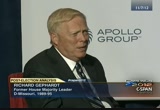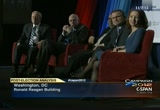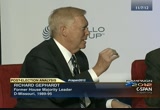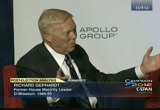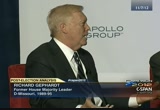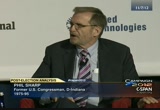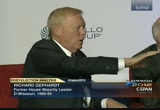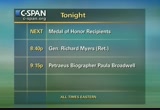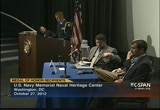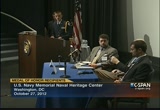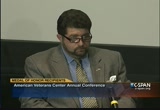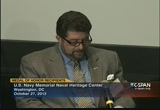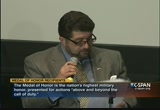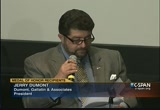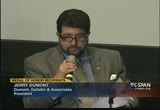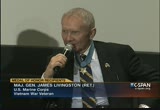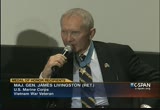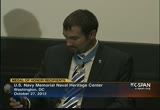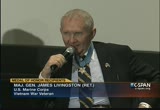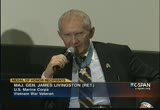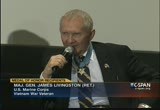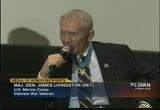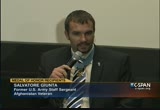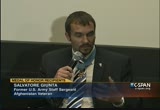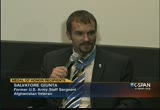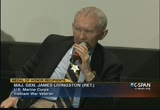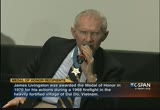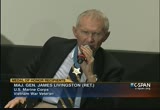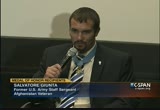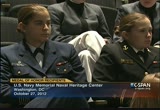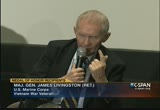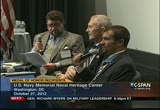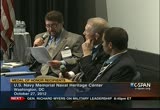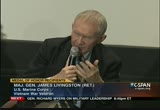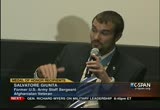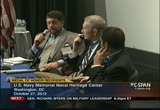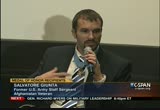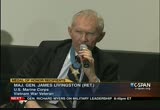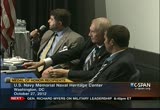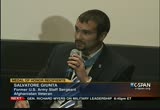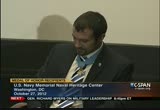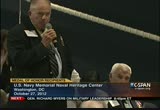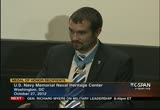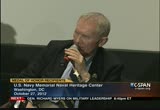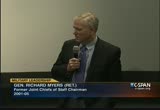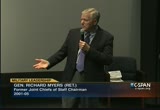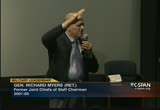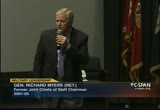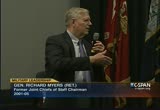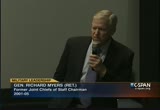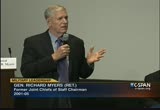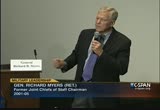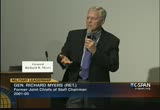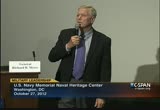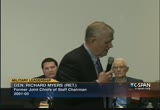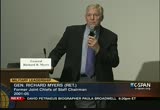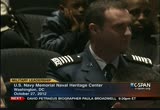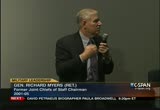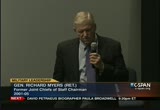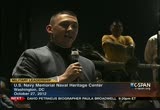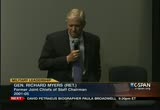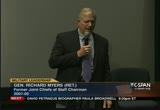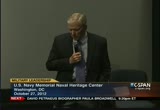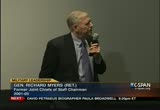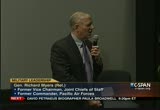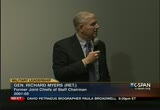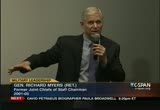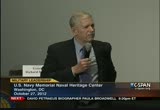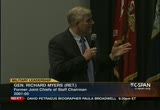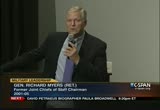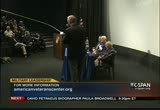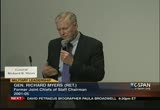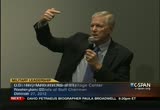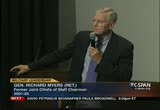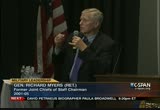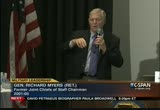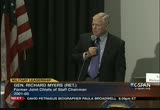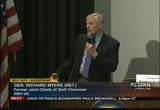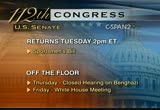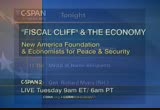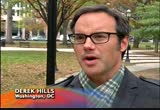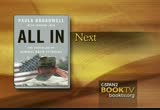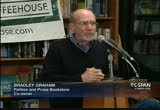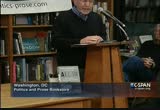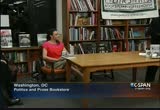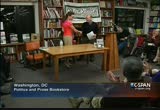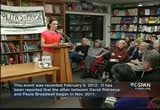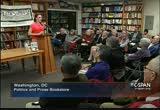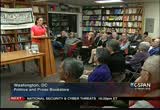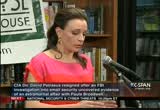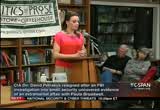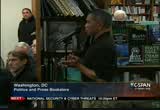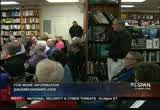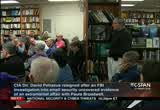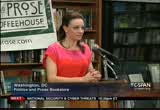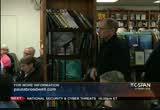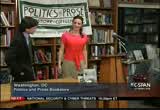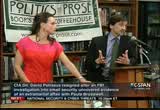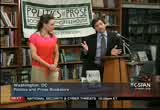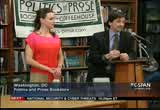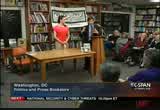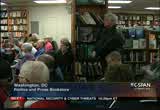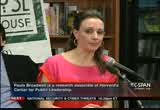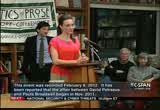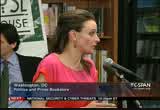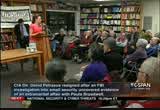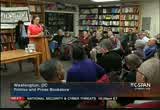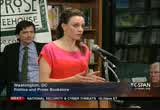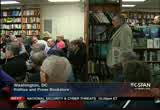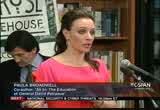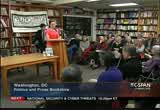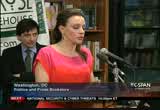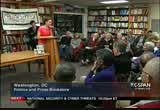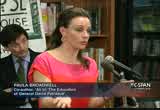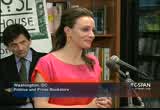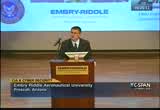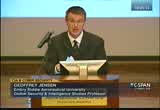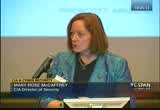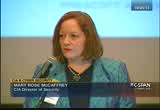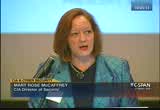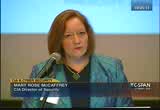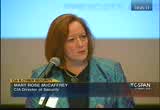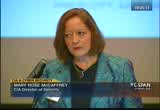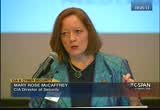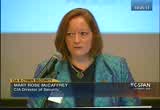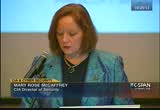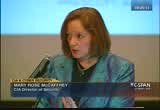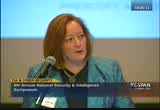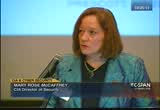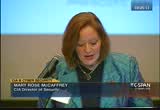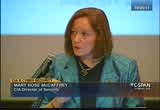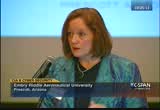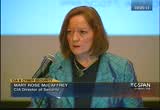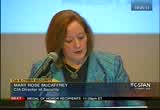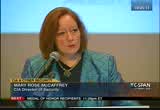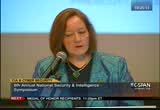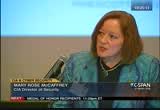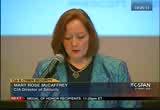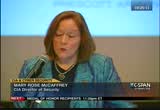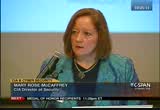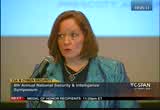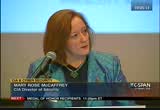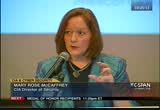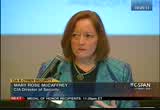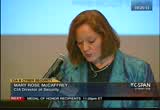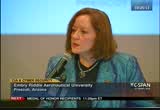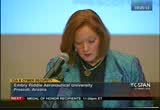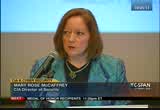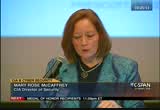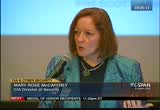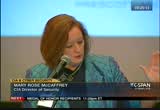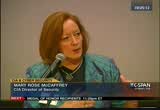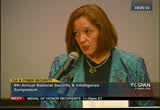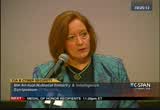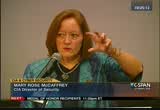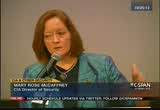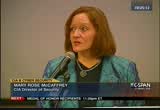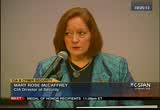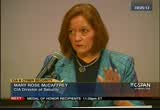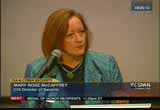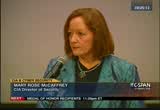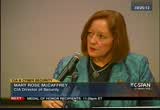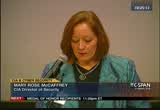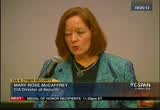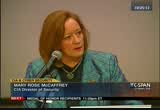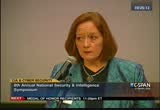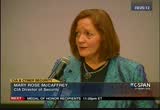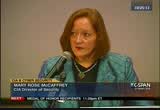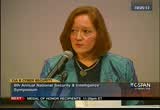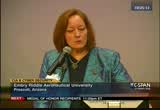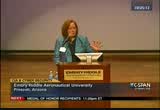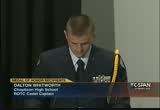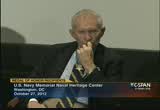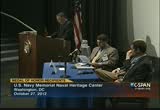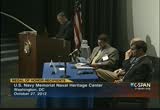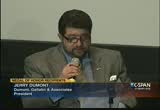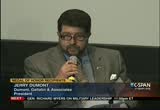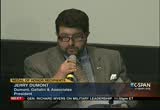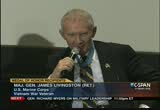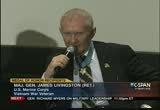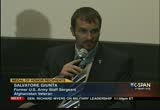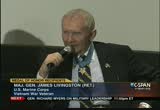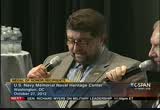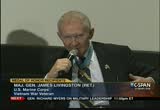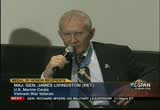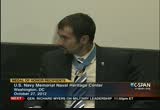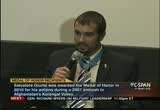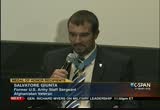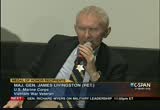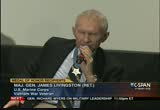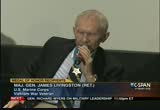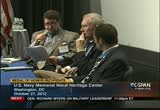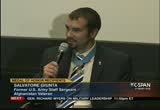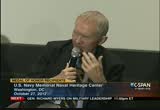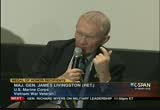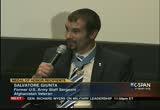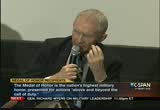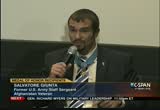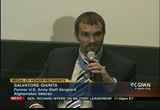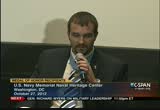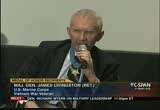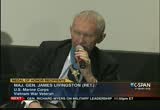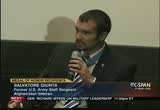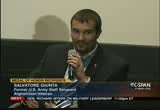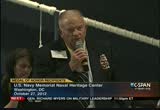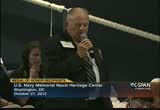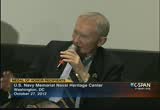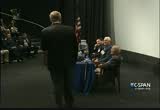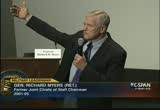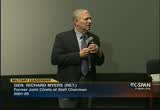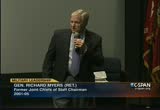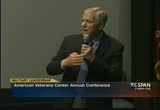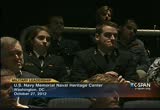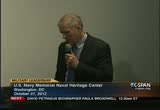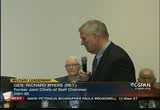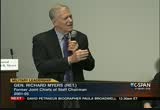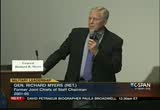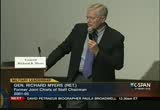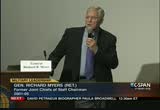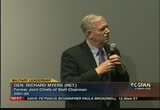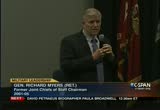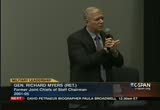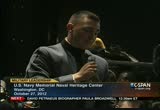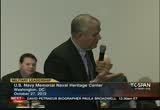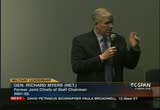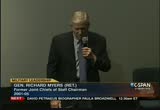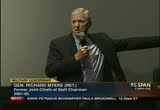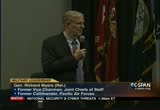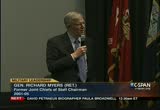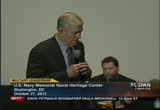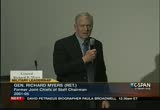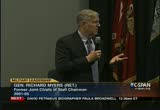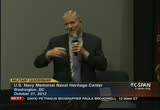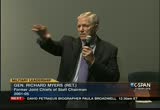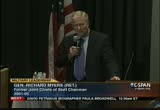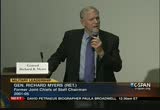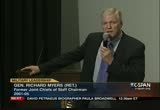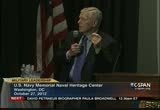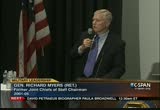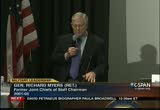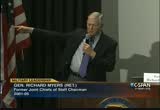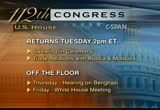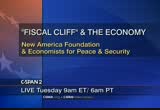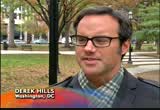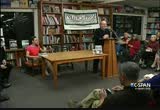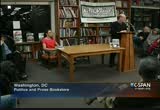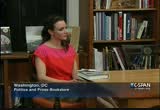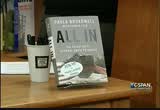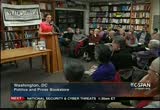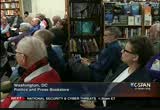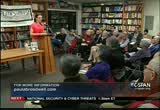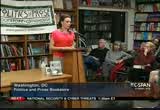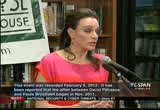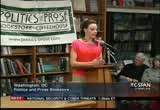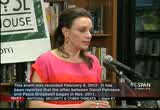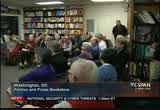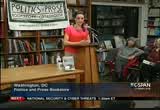tv Politics Public Policy Today CSPAN November 12, 2012 8:00pm-1:00am EST
8:00 pm
said that probably will take place. that is all i know. >> to follow up on that, given the fiscal cliff and everything go on and the uncertainty, is there a need to provide some clarity, at least on the treasury secretary's appointment sooner rather than later prove >> yes. >> yes. >> that is easy. >> how soon? >> tomorrow. >> and the markets are not freaking out right now. >> the markets now understand there is a massive discount on washington. he cannot count on washington on a general philosophy, and they're not sitting there with bated breath saying are they going to -- that does not mean it is not serious, but it means they are not. their expectations are pretty darn low at the moment.
8:01 pm
>> based upon your experience in contrast, do you see an opportunity for tax reform in the next congress in terms of lining up the ducts and getting everything in place that something move during the very next upcoming contest? >> that is a really good question, and obviously it could be part of a grand bargain, because it could be the vehicle to provide some revenue as part of the overall solution, whatever ratio they are looking for in spending cuts as opposed to retina. the worry -- to revenue. the worry i would have, as i said a minute ago, when we did it in 1986 and it was revenue neutral, it was very hard to do.
8:02 pm
i mean, exceedingly hard to do, because you are taking on all the lobbies and all the interests that have gotten something in the code that helps them. bill bradley and i started with the first bill on this, and then ronald reagan picked it up and really carried at, and we got it done in a bipartisan way. when we did our original bill, we took out a mortgage deduction, we took out the charitable deduction, we took out everything, and we got right down to christie, it was 10%, 50%, 25% was the top rate, and we thought it was an elegant bill, but it could not pass muster political. we had all the real estate people and all the mortgage bankers and everybody came to town and said you get rid of the mortgage interest deduction is
8:03 pm
the end of the world, so we lost that. and all the university presidents and all the priests and all the other charities came and said you cannot get rid of that. the only thing we call on to was state and local income tax, and how we hang -- hung on to that i would never know. in the end, we were able to lower individual rates by taking more money from the corporate side, which i do not think you can do now. everybody is saying that corporate rate is too high in america, said to be competitive we have to get at that. this is going to be a really difficult exercise, and if you are combining it with cutting entitlements and defense and other domestic programs to get budget passed, even over a 10- year period, i just think it is a bridge too far, but maybe i am
8:04 pm
wrong, and i hope i am wrong, and it could be, if they really get ambitious and they have got people really intellectually into this the, it could be an important part of a grand bargain. >> i think one of the most important things is what is the attitude of people in washington, and the business community and elsewhere about where this economy is. some people have argued we are just in the cycle and it will come all back. there are a lot of us you think we're in a different place in our history, in this economy, and we have to take much more seriously the allocation of our resources and the impact of that tax code on investment and consumption in this country if we are going to have a piper the economy. that argument -- a vibrant economy. that would lead you to begin to this is much more serious about tax reform. let me add just to make the
8:05 pm
thing harbor, i think chris carter, dick is right, you will not just rate reductions as a way to pay for it. what you might look for is another stream of income, and one theory that is under discussion in some circles, we get a lot of analysis, the carbon tax, which does not have a prayer in hell kind of proposition. if we enabled factions in the congress to get other things they want as important, it might be that he could start something modestly that grows over time and in a sense kill two birds with constant. somebody might get killed in the process. >> that is right. what you look for is the least worst alternative, and that is something like that that may provide that. you would not think that ever
8:06 pm
would see the light of day, but again, getting rid of the big problem, you can include baby something like -- maybe something like that. if you are calling to get a big compromise at the end of it, everybody has to be completely and agree, completely anchor erie, and hate the deal coupl mpletely, but you can get the votes for it. >> i want to thank everybody for this interesting discussion, and we're headed into a very interesting time. >> thank you. >> as the nation observes veterans day, we will hear from two metal of honor recipients. and then general richard myers.
8:07 pm
then paula broadwell, the co- author of a book by david petraeus. petraeus resigned on friday after news of an extramarital affair with broadwell. >> i am proud and honored to introduce two individuals. he is a former staff sergeant of the united states army. he is the first living person to receive the armed forces medal of honor for actions that occurred after the and vietnam
8:08 pm
war perry dead -- be it now war. the major general was awarded the united states highest military decoration for heroic actions in 1968 during the vietnam war. he served on active duty in the marine corps over 33 years before returning in 1995. his last assignment was in new orleans, louisiana. his decorations include the medal of honor, silver star medal, a bronze star medal, the purple heart, and able accommodation nettle.
8:09 pm
i now present to you the staff sergeant and the major general. >> the start of this in 2006. jerry served at hotels and conference centers in new york and northern virginia. while serving as general manager as a resort in leesburg, he founded the national medal of honor society. 15 recipients participated. they went on to raise a total of $150,000. this continues to this day.
8:10 pm
in addition to volunteering, he also volunteers for the church hill center which was founded in 1968. he is the proud father of three children who have also volunteered over the years. he took winston churchill's lifestyle very seriously. the wine flowed very freely. they were great times. take it away.
8:11 pm
good afternoon. is this microphone on? can you hear me now? thank you again, and welcome. on july 12, 1862, president abraham lincoln signed a joint resolution that created the first medal of honor. the first recipient was presented to an army won in 1963. -- 1863. today there are only 81 living recipients of the medal of honor. i'm very honored to be here with two of these great american heroes.
8:12 pm
before i asked general livingston for some questions. i fell one of the most interesting facts, is as whether a woman would be asked to be president of the united states. do we know there was one woman who earned the medal of honor? let me tell you a little bit about her. dr. mary walker was born in 1832. she was a prisoner during the american civil war. she was assigned to duty as an assistant surgeon. she served as a contract surgeon and the service of the united states. she was not a commissioned
8:13 pm
officer. she was an early leader of women's rights in america. she wore pants. she cause a big scandal back in the day. president andrew johnson presented her with our country's highest military award, the medal of honor. she wore that pinned to her chest. it was rescinded in 1917 with 900 and others. she refused to return the medal of honor. she wore it stubbornly and proudly to her death. the story does not end here. jimmy carter restored her medal of honor. we do have one woman who has received the medal of honor. perhaps one of these days we will have another woman earn the medal of honor.
8:14 pm
you can read about her on the medal of honor website. i like to start with you. a your book, there's wonderful photo a few swearing in your daughter in 1991. do you want to tell us about that experience? >> let me acknowledge a special lady first of all. i was coming to her early today. last time we saw her husband we were at a bar in georgia. there. -- a couple of beers together.
8:15 pm
it is good to see you. veterans. i was very pleased to hear about the stories of the korean war. my daughter is a very special person. she was 17 years old. we doctor at the naval academy and got on an airplane and went to the philippines. to is by yourself or a year before she came to visit us. she excelled in the naval academy. she became a flag sergeant. -- flight surgeon. we are just proud of her. put as far as women in the military, i am convinced there is a great place for ladies in the military. i am also convinced the place is not to be on the front lines. and not think that is the place even for men to be some time. this is something we can all be particularly proud of.
8:16 pm
this was done with an exceptionally fine job. i am pleased to have the opportunity to serve. we welcome to the ranks and except on the frontlines of combat that they can do any job any man can do. >> would you like to share your thoughts and comments? >> i did not serve with any ladies in the military really. it is one team, one fight. to defend this country and to stand up for this country, we are all capable of it. we say 18 years old is when you should come in. we are all capable of doing everything we want as long as we set our minds to it. that is a level playing field.
8:17 pm
>> this talk about that you brew -- grew up in georgia. the graduate a year before i was born. book. you need to go back to school and do better or write this tractor for the rest of your life. tell us what happened after that. >> i was going to north georgia college military school. they had me locked up for a year trying to get my grades to be a little bit better. my dad allow me to transfer to auburn university. i joined a fraternity which i never should have done. i partied for a quarter.
8:18 pm
when i got my report from the first quarter, they were all f's. my dad brought me home. he said i could work on his tractor go back to auburn and study hard. i graduated in 1962. there remain a defining moment in my life. that was a very defining moment. >> why did you decide to join the marine corps? what lessons did you learn about leadership during york trad -- during your training? >> after i attended north georgia college, back in those days you had to have two years
8:19 pm
of rotc. i went to auburn university and i had one year of r.o.t.c. remaining. i joined the air force because i did not want to carry a rifle. i finished my two years and i got my draft notice in 1961. i had all intentions of graduating from auburn and going to work as a civil engineer and never had anything to do with the military. i got my draft notice income across ago looking marine purity city could go to quantico and they will get you in good shape. i had to do both boot camps and -- in one summer. i then went back and graduated
8:20 pm
in joined the marine corps. it was the most defining experience of my life. i have all intention of staying in three years and getting out. as i got involved with the people in the leadership and the mission of the marine corps and what we're doing for the country and just the experience itself, i decided to stay. it was a great opportunity for me to serve the country. what i learned from that experience is everyone that you meet in the military and the country has something to offer. everyone has something to offer. everyone is capable of doing something. you are more capable of doing more than what you expect to can do. i always say that we always raise the bar higher. that was some of the experiences.
8:21 pm
people are extraordinary. the young marines were exceptional all through my career. >> your younger days were a bit different. i read that you grep up in iowa. you worked at a subway sandwich shop. >> i did. i was a stand which artists. -- sandwich artists. >> you served under john fitzgerald kennedy. why did you decide to join the united states army? >> i was a senior in high school. i graduate in in 2003. to school anymore. i did not want to go to college.
8:22 pm
i did not know what i wanted to do. one night i was mopping the floors around 930 or 10:00 at night. a subway was closed and a regular commercial came on and something to the tune of see the recruiters to get a free t- shirt. i was working as subway. i wanted a free t-shirt. that sounded fun. i went down there and talked to the recruiter. he told me what they tell you. we are a nation at war. we have been at war in iraq since 2003 and afghanistan since 2001. if you want to make a tangible difference, join the military. i thought that was pretty solid. i took the shirt and i left. what he said to me really resonated. all these privileges and freedoms we have as americans and given to a so really, at such a great cost. they come from the costs of
8:23 pm
other people that have provided us this lifestyle. all these people have something in common that they have stood for sending more than themselves. i thought that sounded like something i wanted to do. i am proud to be an american. the best way i could do that was to join the army. i went in and i told them wanted to join the army. he asked me what i wanted to do. i did not know. i thought you just joined and they decided. i had to come up with something. what do want to do? spit and fight bad guys. there was a parachute hanging in the office. of searching for something. i said jump out of planes. he said that is an extra $150 a month. i wanted to do it.
8:24 pm
i signed up for four years. >> you were decorated with the medal of honor by president nixon in may 1974 your heroic actions. in looking back, how did the training you receive help you have the courage to take the heroic action you took that day? >> the defining moment was witnessing the young americans that i was certain with. -- serving with. and understanding the intensity. the head into companies up until that point.
8:25 pm
they had been wiped out. this is a thing that i remember most about that particular battle. the thing that i liked it is back morning we had a company totally pinned down. later we found that there were 10 vietnamese in that area. -- 10,000 vietnamese in that area. i had 180 marines. we had to go across a rice patty that was totally open to help rescue that particular company. at 5:00 in the morning, i tell these young marines to fix bayonets and we are going. there is no moment of the
8:26 pm
legislation -- of hesitation. there is no looking back. fellow marines. i tell you what. that particular moment in my life, to see that happen with a 19 year-old marines, it is a defining moment in my life. how great and how lucky this country is to have young people here would be in a situation of that sort on that morning who did not realize what would happen to them. as a consequence, 35 marines walked away from that engagement. it was not over. i said we have to sell up and held the other country. the 35 remaining marines are hesitating. it is an indication of the
8:27 pm
exceptional quality of the people who are wanting to serve this country today your and never was so proud to see how what they would do in a moment of difficulty, how they would rise to the occasion. i did not answer your question. it was a message to wanted to get out. we are blessed in this country. >> president truman often said he would rather wear the medal of honor then the president of the united states. you received the medal of honor by president obama. what did he say to you when you were presented with it? >> that is a difficult question. i do not remember that so much. that he was proud of me and that the country was proud of me. one thing for me that that it,
8:28 pm
it is not for me. i've never been in a gunfight or battle alone. i've never been asked to do anything alone. we have always done it together. it is not about the individual. it is about the team and the person to the left and right of you. that at the white house thing with the president was something very special. to see my buddies that i fought alongside with receiving the accolades was something very special that validated what we were doing and that people did appreciate what was going on in the small pockets of the mountains in afghanistan. he told me he was proud of us. >> we have a very important election coming up in a few days.
8:29 pm
a few questions about the democratic process. i like to know your thoughts on the democratic process here in america. some people have to live under the role of dictators and elected leaders. -- unelected leaders.>> i just about the number of people in the world today that have an opportunity to vote an exercise that democratic process because young americans were willing to go into harm's way. as i listen to the korean veterans, south korea. i listened to the world war ii veterans in thing of all the people in the world who have the opportunity to exercise that right to vote and elect their leaders. the thing i would say about this great country we call america is world.
8:30 pm
we absolutely need a strong, responsive, at least from upfront america. if we did not have that, i'm not sure where we would be today. your responsibility is beyond my ability to express. what you represent not only to your country but to the people of the world. i am really honored to have a chance to have served this great nation and witnessed through the years what we have done for the world's, specifically what those who have served have done for the world where people can exercise the freedom to vote. >> i am 27 years old.
8:31 pm
this'll be my first time voting. i say that because when i was in the military, i spent all my times overseas. i did not want to have to vote on something and then find out the person i wanted did not win and the decision on what we were going to do was going to be up to someone else. i am excited about voting. i feel bad that i am 27 and it will be my first time ever have. i am excited for its. this'll be a good step for me to actually participate in my own government. i'm pretty proud of it. we should. a lot of people still do not have that opportunity. we are very blessed to be able to have that opportunity. >> for those individuals here
8:32 pm
who decide to serve in the military, how does that leadership and experience better prepare them for civilian life and work in the private sector? >> i think the biggest, and i can say in answering that question, i think the thing that really defines the military and how it translates to the civilian sector is to learn about people. if you want to be successful in the military, you do it through other people. you have great expectations of other people. i look at the ceo's in the country. they do not do by themselves. they are able to delegate and get people authority and responsibility and empower people to get the job done. regardless if you're in the military or the ceo of a company, if you have the ability to really understand and empower and delegate
8:33 pm
requirements to people, people will perform for you. there's really no difference between the military and the civilian world. the person who knows how to deal with people can be successful either in the military or as a ceo on wall street. >> i think the military has given almost all my experiences. too often in the civilian world you have a boss. in the military they have a leader. they're like to say follow me i'm going to do this. i will show you how to do it. next time you do it. they can still be your boss but first and foremost they are leaders. the military taught me about standards not just making standards in setting standards but obtaining the standards.
8:34 pm
not everyone is good enough to run with the big dogs. we except that. by inspiring one another in the military, as soon as you join you will be inspired by others because it is no longer about you. it is about you and everyone around you. and having a list of goals. a nine year old can have goals. without a plan failing to prepare is preparing to fail. that is a guarantee. the military has helped orchestrate a plan. >> as we are approaching this election, i like both of you to think back in history, all the way back to 1776. who are some of your favorite presidents you admire the most
8:35 pm
8:36 pm
correct there, fella. >> i went to john f. kennedy high school. it seemed to me he was an amazing president. one that has always stuck out to me fdr and the new deal and how he inspired a country in the personal adversity. he had polio. he is in a wheelchair. he did not let that bother him. he did not show weakness. no matter what we think our disability may be, we can overcome that and show a strong response and we can push forward and motivate others. for that i like that. i like him. >> we had so many inspiring presidents. i do a lot of reading about george washington. that had not been for george washington we will not of a country. i've always been very inspired by him. abraham lincoln made those decisions that are necessary at the time to pull the country back together and put us on a new course.
8:37 pm
in terms a modern day, i look at all the presidents. we are at a very critical point in our history. i think he has been the most touching for me individually. i hear pros and cons about the president. i think the american people thought they were the best candidates. i would ever say we've ever had a bad president. all is that better presidents. they did to come along at the right moment. i think they all came along in the right moment. it is a tough job. i think we have been blessed to have great presidents. at this point i think we'll
8:38 pm
open it up to the audience for questions. >> thank you. before that day in the white house how you deal with the massive attention that has befallen on your family that de? the intention is good. it is not about me. it is about actions that happen every single day. i try to stress how generic my story is. >> the attention is good, i think, because it is not really about me, it is about the military and actions that
8:39 pm
happen every single day. i tried to stress how generic my story is. in the day i received the medal of honor for the actions, october 25, 2007, i was not there alone. i did not shoot the most bullets or kill the most bad guys do anything more amazing that anyone ever of us were doing. we had a job to do. we had more steps to concord and people to cover them and we -- we did not go in there not knowing what we were getting into. none of us worked at subway. we were all professional soldiers. i think after receiving the medal of honor, i still was one of the boys -- never been special. average at best. it speaks so greatly about the military. i can say that because there are a lot of people are around the united states within that i am something special. and i am not. i can use this medal because they will listen to me and it will give me a microphone to say i am not. we are all capable of doing more and changing the world. every single day we wake of we have a new opportunity to do good things for ourselves and others and if we don't take advantage of that we are missing out of the opportunity. the spotlight is on me but i will tell stories about of the people. it has never been about me, ever.
8:40 pm
>> of u.s. army retired -- i was with you this morning you receive the medal of honor at the sheraton hotel in washington, d.c. i met your wife also in the elevator and had a good chat with her, too. i did not know if she is here or not, but i would sure like to meet her again. when i talked -- you have, long way. one i talked you that they. you were going to go to the white house that morning. and that when i met you at the hotel. there were a whole bunch of 173rd guys there and i was there for the funeral of a guy i served in vietnam with the guys -- too see ed burke be buried.
8:41 pm
you just happen to be there waiting to go to the white house. and maybe you do not remember that. i gave him my card and i said if i could help you in any way, let me know. i am still around. it was an honor to meet you. and i've got a grandson in the big red one in afghanistan right now, and he got wounded about three weeks ago. just took a few mortar fragments in the legs and was calling home and saying he was sticking with the outfit and not getting medically evacuate. i just want to say, hi. >> hello, sir. good seeing you again. [applause]
8:42 pm
>> i think i am getting noted about asking about books but i have been a teacher-librarian, and we are all fortunate enough to be here in this convention and it is education which is better than any class from i have been in. tell us about the books. we were talking earlier about the one written about you. and the one thing we can do is go back home and make sure our public libraries and school libraries have these books so people can learn about the people we have gotten to here today and this whole week. >> i just wanted to acknowledge the vietnam veterans who are here. let me see your hands. i want to thank you for your service and, ladies, for your service and say, we never lost a fight in the war, it was lost in washington.
8:43 pm
and i just want to acknowledge the fact you did a wonderful job. thank you very much. [applause] >> thank you, everyone, for joining us today and special thanks to general livingston and sal giunta. the american veterans center also hosted aokinawa that was the bombing range and you made your pill gram image to pile's memorial there. that was something we had to do actually. i think it's still morning, good morning everybody. i got to thank jim for putting me between you and lunch. i've been that way a couple of time in the last two weeks.
8:44 pm
it will end on time. you had a wonderful experience so far since thursday. you've been exposed to some real american heroes i think for the younger people in the audience learned a lot about what it means to serve in the military, what kind of dedication and professionalism it takes. i want to talk first about the fact that i'm here alone this morning and how it would have been if i had still been in the military. we would have swooped up outside in a swirl of at least three cars. we would have piled out with security and i'd have an aid that would be nervous i would ask for something he didn't have. i don't know what he had in that bag but it was big and he always worried i'd ask for
8:45 pm
something he didn't have. i'd have my executive assistant. i'd have a speech writer and the public affairs officer in case the media was going to stick a camera in my face. it was a real entourage and now it's just me. there comes a point after you retire you figure it's all over. that was then, now is now. they say for president eisenhower then before he became president that moment came when he was sitting there with his assistant and he was picking up the phone and he says come in here and listen to this, this phone is not working, listen to this racket and his assistant said that's the dial tone. because we know most generals don't make their own phone calls. that's when i knew it was all over. when i was chairman the army gives you a great house on fort mire. it's a duplex but it's nice, the problem is it's four
8:46 pm
stories so you have things in that house you don't see for the four years you're chairman so when you move out and move into a townhouse the myers family can afford you got to get rid of some stuff. it was about this time of year, i retired end of september in 2005. it was about this time of year going to goodwill and get to the goodwill place here in arlington virginia. it's a pretty good size operation and i pulled into the parking lot and i'm delighted to see it's just me and my little truck and the place where you donate your things. so i said this is going to go faster than i thought i can get back and finish the painting i was doing. and the problem was there was a goodwill truck that was between me and where you donate your goods and it was blocking the way. so i rolled down my window and there was a driver in it and i said can you back up a foot so i can get around you to donate my stuff.
8:47 pm
and he says without thinking, blinking or anything he says you're going the wrong way. and i kind of the way he talked to me and sure enough there was an arrow blind me pointing the other way. so i said okay i'm going to wrong way but it's just you and me in this huge parking lot but if you could back up just a foot i'll get around you and go donate my stuff. he says one more time without blinking or thinking you're going to wrong way. there commenced a discussion about can i get this guy to back up. a nice discussion but eventually with a look on his face that was not pleasant he backed up and i got around and donated my stuff. i'm heading back to the townhouse thinking i've been retired two or three weeks. what would i have been doing a month earlier? i could have been at the white house with the president in the oval office. that's not a pleasant
8:48 pm
experience but it's serious work. or i could have been with the joint chiefs of staff or secretary of defense office so what i was doing three weeks after i retired, trying to get a truck driver to back up one foot so i could get around him. he did not care who i was. so that's when i knew it was pretty much over. however you came in before with 7 people and three cars, that is all done. you're going to have to come in like i came in this morning trying to find a parking spot with all the cops out there. let's talk about and i want to involve you if i can, you've heard for the last several days, you heard from collin powell yesterday about leadership and we'll go by the service academy. so somebody is going to have to pipe up. so this will be for the naval academy.
8:49 pm
give me one characteristic of good military leadership that you think, something you've learned while you've been in the academy you've learned from your church or family or you've learned in the past couple of days. who has been picked? >> one of the most important character stix of leadership is truly carrying for the people you're responsible for and realizing that you're there to work for them, it's not they're there for you. >> that is a great lesson and let me give you -- i would call that selfless service or serving something beyond yourself. and i can tell you in the military it's a very important trait. i bet the folks at west point have read already once an eagle.
8:50 pm
have you yet? >> where are the west pointers? have you read that yet? i think that's mandatory reading. there it should be for everybody. but the two main characters two different styles of leadership. that is the quickest way to learn the respect of your piers and your sup yors if they figure it out and certainly your subordinates. and when you're dealing with the lives of men and women you cannot stand to be the kind of leader that people think are serving themselves. it's interesting not to out the naval academy. it just happened to be a mid shipment. there was a day when some naval folks were in the building they were doing research and i was told on a meeting on the way to the meeting with the joint chiefs by my secretary there is
8:51 pm
this mid shipment that's been outside your office for about an hour. i told him you didn't have time to meet with him but hest relentless and he's going to pounce on you as you come out the door and walk down to the place where you meet with the chiefs. we call it the tank. sure enough, i come out of my office and here is this guy that comes up sir can i just ask you one question? i said sure go ahead. he said what does it take to be the chairman of the joint chiefs of staff? and i thought woe, somehow he's a little bit off kilter and thp is about a three to four hour conversation back and forth and i had about three or four minutes before i would keep the other chiefs waiting. so i said okay we went out of the way and i talked to him about why would he care when
8:52 pm
he's still in annapolis. why would he care what it takes to become the joint chief of staff? >> i said are you number one in academics? no, sir >> number one in military training? no, sir. what about athletics of division one sports? well no, sir. i said the point is you don't have to be all that stuff but what you have to be is the best at what you're doing at the time. and you're thinking so far ahead and if there was a map to become chairman of the joint chief of staffs i don't know what it is. and you shouldn't care about that. you should care about being the best mid shipman you can possible be. i was worried he was thinking there is some glory in all of this. there really isn't. it's all about service for the
8:53 pm
reasons you articulated so thank you for that answer. >> west pointers you're on next. give me a trait you think is important for military leadership. who is the stucky? >> i know you guys learn humility. >> you know the word was humility. i think it goes a long way. i think it goes with selfless service and caring for others before yourself. it fits right in there. one of the things you'll find out as you continue to graduate, you're commissioned and doing whatever you're doing that arrogance doesn't go very far in the military profession. it's sort of a cousin to the selfless service.
8:54 pm
if you think you're really better than everybody else which would lead to arrogance then prove it. prove it in whatever you're asked to do whether you're crawling around in fox holes or whatever it is, prove that you're the best at it where the commander when he wants to find something out, he asks you about that. and i think humility in military service frankly goes a long way and i think arrogance again from your subordinates in particular, your piers for sure and your supports if they're wise enough to detect it is a sure way to not do very well. we've all worked with people who think they're the smartest person in the room. they may not be the smartest or wisest and usually make some fatal mistake along the way. so a little humility. does anybody think we can do it by ousts? no, we need a lot of help along the way.
8:55 pm
where are the air force? >> right here, good. you don't have to speak unless youre the only one here. you got a guy? >> where are you from? >> west virginia. >> i would say empathy. >> all the a good trait but that talks to to me is relationships and being able to form relationships of trust. i thought somebody by now would say the word integrity but i'm going to relate that back to this empathy idea because the
8:56 pm
one thing you have to do in the military is you have to be believed and credible. so no matter what branch, what particular skill set people have to believe you're going to live up to what you say you're going to do. a good example i saw all the time being a fighter pilot in the air force was when you take a ship out with powerful radars everybody has a search responsibility and you already be searching where you're supposed to search and not where you think the bogies are you want to kill because you're going to keep the flight alive by doing your job, like football teams or whatever. you got to do your particular job. and so you got to be trustworthy. i think you also have to trust. and i think the empathy helps you gain sort of the personal relationships that enable all that trust and integrity to work. that's the way i would look at
8:57 pm
it. when i became chairman, the bush administration had been in office about eight months and i did not think -- and i was the vice chairman at the time so i had worked with secretary rumsfeld about six months. i did not think we had a good relationship. i was going through a 24 blood pressure check. i don't know how many folks have done this but you got this cuff on and at random moments it would puff up and we're having a heated discussion and i'm totally disagreeing with what the secretary is saying and all of a sudden this thing goes poof poof poof. i don't know what the record is
8:58 pm
for blood pressure checks but i'm about ready to set one here at the pentagon. it was not a relationship after he nominated me to the president to be ob the chairman. but over the course of time because we both worked at it very hard you can develop that trusting relationship. and so i think empathy for what his position was as a political appoint tee a senior civilian in the department of defense and all the responsibility he has and like wise having to respect what my responsibilities are and why they're different from his. so v.m.i.. how do we pick this person? >> you just took mine integrity. very intact sir. >> say more about that. >> as a leader the people who you work for and work for as well if you lose your baring their going to draw off of that. and the same thing you constantly work with people and
8:59 pm
have you to have tact and know when to give them a swift kick in the but or a hug. >> you've learned a lot already because some need a kick and some need a hug. that's excellent. bearing in tact, i havent thought about it in those terms. but a leader has to be disciplined because you are a role model and they say that 80% of communication is non-verbal. so what you say is important but not as important as the non-verbal which i translate into what you do. how you act. and you can lead by simply setting the standard. i can remember an air force one star at holleman air force base he was the division commander when we still had air divisions
9:00 pm
and he had a big push about seatbelts in the newspaper. seatbelts save lives, seatbelts. in those days i think we had a commanders corner where you could write in and complain. somebody wrote in and said you're all over the seatbelt issue but we noticed -- by the way this was in february we noticed last thanksgiving you left the exchange parking lot with your seatbelt off. you don't think people watch leaders. the good news is you're the leader. the bad news is you better live up to it by the baring, by the tact, by the discipline to be the role model. so you let your hair go or not
9:01 pm
shine your shoes or not wear the uniform properly. when i was the commander under a lot of scrutiny of officers, i did my best to be the role model. unfortunately my dog let me down. i had this old english sheep dog the harry kind, hard to ig know and he loved to sit on the front porch and watch the traffic as everybody went to work. more than once he got off his restraint somehow and i got a call one morning and said hey your dog is loose. don't worry the security police have him and they're giving him a ride home. and he would sit back like he was somebody on the way home. that is not being a good role
9:02 pm
model. then i would have to go home and chastise somebody in the family. certainly not me that let him off. it's exactly about that. what about no tolerance for discrimination? how does that fit? i can remember taking over a fighter squadron where a previous commander we had i think three or four folks of the mormon religion in the squadron. they didn't drink. they would come to happy hour on fridays at the bar when we used to do that kind of thing. and they'd participate and drink a soda and didn't drink. and he held this against them for some reason. he got fired and i became the leader. not for that but for some other stupid stuff. let me tell you how easy it was to take over that squadron. all you have to do is embrace everybody. and if you don't in a squadron, if you exclude three people not only do they not people part of the team but you're not going to get the job done. our military is not going to get any bigger by the way through most of your careers. we need everybody in a major way. so i think it's also good by
9:03 pm
the way that you're in the military or going to join the military for those at the service academies and v.m.i. and probably some others in this room. you're joining an organization that has no tolerance for discrimination. and it's been going on for a long time. it's taken a long time to get it right since 1947 when president truman desecrated our military. it's taken a long time to get it right. i remember in the 1970's we had an experiment with women can women work on the air force flight line as maintainers? now of course they can. but in the 1970's there was a question. and i remember some of the guys they can't be maintainers because they can't carry these heavy tool boxes. well it turns out negotiate can the men, they're all on doll
9:04 pm
liss okay. they can't put these fuel tanks up . there they have devices to do that with that will save everybody's back if you use them. so we've come a long way. to my last assignment in okinawa. when i was flying f-15s and women started to enter the force and we were out on two of us good guys and two bad guys. one of the bad guys was a female f-15 pilot and i can remember my last sorty in okinawa kill the f-15 and she got behind me and won that particular engagement.
9:05 pm
so i think we ought to be proud of the fact that we have no tolerance for discrimination. it doesn't mean there is not but there is no tolerance for it. so it's two strikes and you're out of there. i don't think they give you three strikes anymore. they shouldn't. >> what else? shout out a characteristic. responsibility to piers and subordinates. >> i think that goes hand in hand with this notion of integrity and being responsible and there is a loyalty component i think is whey read into what you're talking about and you have to be loyal down as well as up.
9:06 pm
and my guess is you've worked for people that are very loyal up, not very loyal down. it's not a good feeling. it goes back to the selfless service idea. i think that's exactly right. somebody else yell something else out. we got some folks in the mid that will look like they need their lunch very bad. anybody here in these two rose. >> being positive. >> yeah, nobody wants to work for a grump. you got to have a positive outlook and listen to these folks we listen to today. still today we got positive out looks. as bad as it was in okinawa where i had a good outlook. if anybody eats lunch with him don't slurp your soup. the one thing about the profession some of you are going to go into pretty quick if you haven't figured it out, you're not going to get
9:07 pm
rich. figure that out at this point probably. i can remember after i retired i was doing an event for morgan stanley up in new york city and their headquarters over looking the city you get a real sense of you are somebody in power and while we're waiting for the guests to arrive that i was supposed to talk to, some of the morgan stanley investment bankers were talking to me and this one young guy came up and said it must have really bothered you to not have made much money as you served in the military and became chairman. that must have really bothered you. i said we never thought about it. you had to think about that and talk to your piers about this all the time. i said no. and the conclusion that was the difference between military culture and that culture was like night and day.
9:08 pm
they serve for the bonus for the money and we serve for other reasons that we've talked about. and that's a very noble thing. and you have heard it for the last several days. war is not glorious but the service of people to their country can be glorious and you've heard some real heroes talk about this service, service is something bigger than yourself, selfless service. really important characteristics of our military culture, integrity. the fact that it's a mediocrity. it doesn't matter where you went to school it matters how you do the job. and you've seen that. in other words how would somebody out of kansas state university? i did pretty well on r.o.t.c. but besides that there were a
9:09 pm
lot of things i didn't do well oh at the university but how can somebody like that wind up as chairman other than i out lived a lot of people and hung around. but how do you do that? they look more at what you are contributing to the mission than on where you went to school. by the way i'm a big believer in service academies. i think theyre an important piece of our military. v.m.i. is as well. some of my closest friends in the air force were v.m.i. graduates. but you are joining a great culture. and for all the reasons we talked about a lot of the reasons in here. for all those reasons go for it. and some day you'll be sitting on a panel like. this jim roberts and i were talking one day i'll be on a panel like this and fy start wandering on you got to have a
9:10 pm
piece of string tied on to a piece of my anatomy you jerk that and i'll say it's over. until then. we're about done. i'll do two questions from the audience. i have to run to another event. i'll be there tonight so if you want to talk further about this or experience. i'll take two questions. yes, sir. >> during your time at chairman how did you keep your connection with those down at the bottom and keeping in that selfless service how do you continue to serve those in the armed forces at that higher level? >> first of all, as you probably understand even whatever you're doing now, the more responsibility you have the more isolated you get from what is going on. one of the ways i would do it that would bug the devil out of senior officers. when i would go to afghanistan or iraq or wherever there were troops.
9:11 pm
i would say i want to meet with jr. enlisted and senior enlisted separately. i want no officers here. i want to go in and talk to them. they did not like that. and they come back and say they don't -- >> no that's how i want to do it. tell them to go away. after a while you can break it down and maybe you can actually learn something that is interesting that maybe you can help fix or whatever. so i think you have to fight for that especially as chairman. nothing we did -- all the service chiefs have a senior advisor. we instituted. that who was against it the most it was senator enlisted advisors. why? because there say protocol ranking and they figured one more person coming in over them would hurt their chances of getting military air lift support.
9:12 pm
it took i don't know how many breakfasts and lunches to finally convince them that the chairman needs feedback too but we're a nation at war i need to know what is going on so i have a senior enlisted advisor. we got it approved and then it was done away with it and it was brought back. so those are a couple of ways. was there a third part of your question? >> that was it. >> obviously you got to fight for it. if you don't get out and see what's going on you're not going to know frankly and even then, i think you're not it's not perfect so you have to rely on other people. i would go to the service advisors and say what is going on in the army. tell me what the problems are so when i talk to audience you're a little better informed.
9:13 pm
one last question? we'll do one more. >> what was it like when you first realized you were a leader? that's a great question but i don't know how to answer it. i think if let's say you're in r.o.t.c. and you've been given leadership -- i think i was in boy scouts when -- what did we call them? patrol leaders. i think the first time i said i've got to start doing some of the things we talked about in here. i've got to be organized and be a role model. so when somebody puts you in your first leadership position and boy scouts might have been it for me you suddenly realize
9:14 pm
there is a lot more work to this. is and so that's how i'd answer that. last question. >> earlier you discussed strength and we heard about discipline and staying positive. how did you handle yourself on 9/11 being the vice. >> i was the acting chairman on 9/11 and general shell on the was the chairman on his wy to a nato meeting. he got back that afternoon. he was one of the only airplanes to come back into air space. if you know general shell on the he was persist nt and he fought his way back in and wouldn't take no for an answer. and there wasn't much danger of any aircraft they were all on the ground. so hell fought his way back. people tell me that the way that the secretary and i worked with the staff of national military command center that
9:15 pm
they were -- they said it was calm and cool as you work your way through the checklist of what happened and how do we prevent this from denigrating the capabilities of our us military. how do we keep further harm from u.s. citizens not knowing when the next attack was going to happen. so i think a lot of your training, a lot of stuff you learn as you go through whatever you're going through kicks in and you just get right to the task at hand. in fact i was oh so focused on the task i made one huge mistake that day and that was remember i said our house at fort mire was right next to arlington cemetery which is not far from the pentagon. so i was on when i will when the pentagon was struck. it was about 2:00 in the afternoon and said who called
9:16 pm
my wife? thank goodness i had a wonderful army executive assistant west pointer class of 1974 and mat fortunately called marry joe right after it happened. because she heard it. the windows in the house rattled. but she got instant feedback that i was okay. i was so focused on just trying to get through what we were trying to figure out because there was lots of input. there was the bomb had in front of the state department. there was korean airline they're wasn't responding to air traffic control. somebody at u.s. airways took out of madrid showing a hijack code. not to mention flight 393 that crashed in pennsylvania. i think you just start doing what you're trained to do and
9:17 pm
fortunately i think i had -- i know we had a great team and the team there in the national military command center e folks that do that for a living, they were the rock that i leaned on plus the service teams but and on and on. before i say good buy, i have to run but if you want to talk about this or anything further i'll see you tonight. otherwise have a great afternoon and thank you very much. >> congress is back tomorrow at 3:00 p.m. eastern. the legislative agenda this week includes discussion with trade of russia. live coverage of the house is here on c-span.
9:18 pm
also at 2:00 eastern live coverage of the senate as members resume consideration of a sportsman bill. off the floor this week members ofts congress will hold hearings on the terrorist in benghazi attack that killed leaders. and a meeting with president obama about fiscal issues. in a few moments a book tv event with paula brot we will. petraeus designed after an f.b.i. investigation uncovered an extramarital affair. then a forum with two med doll of honor recipients and the joint chiefs of staff retired general richard myers.
9:19 pm
several live events to tell you about tomorrow morning t. new america foundation hosts a discussion on how going over the fiscal cliff would effect the military, social security and medicare. that's on c-span2 at 9:00 eastern. at 10:00 eastern on c-span 3 looks at al qaeda groups in yemen. >> c-span invites middle and high school students to send a message to the president through a short video let the president know what's the most important issue he should consider in 2013 for a chance to win the grand prize of $5,000. it's open to students grades six through 12 and the deadline is january 18, 20 16789 if complete details and rules go online.
9:20 pm
>> i enjoy watching book tv and the rebroadcast of various news programs. it provides coverage of events without all the editing that you'd see in other programs and really gives me an opportunity to consume the news and information and make up my own mind about what is going on. c-span is a great way to get an unfillered view of the day's events. >> c-span created by america's cable companies in 1979 brought to you as a public service by your television provider. >> c.i.a. director david petraeus resigned friday after an f.b.i. investigation uncovered an extramarital affair with his biographer. they talked about their book
9:21 pm
last february. this is an hour. >> i'd like to say a word about an important event coming thup april. it's world book night and it's an ambitious attempt to hand out 1 million free books around the united states. you can read about how this amazing effort is being organized and sign up to get involved yours at u.s. dot world book night.org. i mention this because the deed line is sign up is tonight. so there is still time after this event. now a word about our guest this
9:22 pm
evening paula broad we will and their new book all in t education of general petraeus. petraeus has become the most prominent military general since world war twofment and while he's already been a subject of several books, paula was given unusual access to him and has brought his story up to date. as paula writes early in the book one of petraeus' most important mentors general gallon vin talks to petraeus about the concept of what gallon vin called the big m. which stood for individual mystique or mithology. the idea is that troops need to be able to make their commanders bigger than they are, to mag any fi them. pat on the had pistles tols
9:23 pm
ridge way misis also grant sigars. petraeus is the e pitmy of soldier scholar. he's famous for being the lead author on counter insurgency warfare. on the battlefield he's credited with turning things narned iraq following the decision in 2006 to surge u.s. forces. there and he faced a similar challeng which involves a case
9:24 pm
study of pet pelt as an example of transformational leadership and organization. as a graduate of west point in an army reserve officer paula knows the army from the inside. in her book she takes readers into briefing rooms and command post and training sites and battlefields. and she was granted a number of opportunities to travel with petraeus and even to jog with him which as anyone who has tried that knows that probably deserves a medal in itself. petraeus is notorious for the intensity in which he works out and it's the same intensity he applies to everything he does. i might add paula is no agent let i can slacker. she is a runner and ranked
9:25 pm
number one in overall fitness in her class. she is donating 20% of the proceeds of her book to team red white and blew, an organization of veterans using physical if fitness to help them find their new normal. paula was helped in the writing of her book by a talented colleague of mine at the "washington post" vernon loeb. he has lots of experience covering the military and is now the post metropolitan editor. paula plans to speak for about 20 or 30 minutes then she will take questions. if you have a question please step up and use the microphone in the center of the room. afterwards paula will stay and sign books. so please sinals your cell
9:26 pm
phones and join me in welcoming paula broad well. >> before we get started iledd i'd like to see how many veterans we have in the room. great. thank you approximate for your service and i know we have a few folks that belong to team red white and blue as well. do we have any folks from this organization? thanks for coming. it's very important for me to take advantage of the media platform i have with the book. it became a best seller this week which is pretty exciting. for somebody who doesn't like to write that much it's humbling but i have to give credit for my writing part mer for helping us get to this point. i felt it was important to do something subsequentle with the attention the media is bringing to the book and call in the americans to go all out for our
9:27 pm
service men. we oh it to them. we will bring out some characters in the book and we'll talk about their adventures. then i'd like to share stories about general petraeus and his developments. in 2006 general david petraeus was the commander at fort eleven worth and he was helping to write the insurge si field manual. he likes to pay attention to detail. but he came to harvard university and wanted to speak to students about the merits of counter insurge si approach to fighting the rack war which we were losing at the time. he invited a group of veterans soldier scholars to meet with him. i went up to him and said i'm writing my thees sis on negotiating with terrorist and
9:28 pm
i think it could help your team win and you should read it. and he took the paper and gave me his business card as he does with a lot of young sold scholars. he is oip to ideas from anyone and everybody and what has long been called as directed telescoping to reach out to those in different fields to gather ideas. we kept in touch for a couple of years by e-mail. two years later i reached out to him and asked if he would speak to a group of student who were trying to find ways to galvanize between the communication and military and other national security organizations that we as mid grade field officers were frustratinged seeing a lack of cooperation. southeast he agreed to do a tell con ferns from baghdad. he opened his presentation with
9:29 pm
a quote luck is what happens when preparation meets opportunity. and i feel like that has been complempry of his life and my instance with this book. it really cap chures the feeling of how i got this opportunity to write the book. and i'll go into that a little bit more in a bit. so fast forward again. the surge was as we all know instrumentle and doug may argue otherwise but the surge complimented the i frustration and the tied was turned there and we were able to start to draw our forces down. and petraeus came back in 2008 and i was intrigued by how this individual had gallon va niced organization al transformation in this army. brought this new doctrine and shaped the organize shagse of our yinets going to war.
9:30 pm
and i was looking at this from a management perspective. how does an insider affect organization al trance more inflammation and i asked him if i could use him as a casei bega- mail and we had a chance to go for a run and i asked my could interview him and brought a tape recorder. this is a test, in the preface of the book that shows why gained rapport with him. i could keep up with him and we ended up getting down to a six minute mile. i did not transcribed that interview we continue that e- mail correspondence and i was riding of fanned include ridding his thoughts. i was able to take advantage of
9:31 pm
my tribe, the military analyst with the last several of them had been his aides and there were great informants. there were loyal to him that they trusted me so i was able to get a lot of great access and you know his family at his mentors. they shared correspondence he had exchanged for three or four decades, i could see capt. david petraeus and talking about in 1978 or 1979 how this is how the military needs to balance the heavy and light forces. in the '80s after he visited general galvin, he writes, the only way to change the army is to change its doctrine and i will do that someday. they had a small competition going. as brad alluded, this was "big m
9:32 pm
petraeus was "little m." i could trace his thinking about the army and not all that made it into the book. that may be in my dissertation if i ever finish it. we included some of those in the books you could see at various points what he was thinking back a certain point and then flash forward to afghanistan. in the summer of june 2010, when general mcchrystal in the "rowling cookstown" article rolled out, i remember the discussion about who could replace him. friend said, do you think that
9:33 pm
petraeus could go? as we portrait, he already knew that his name was probably in the hat even though the media was speculating about it at the time. he had received a call from general mcchrystal when the article broke and he said it was going to be bad. he was certain he would receive some vibes from the white house that he would lose his job. admiral mullen -- said you will -- there is a high probability will be selected for afghanistan. he gets into the white house, he is therefore a regularly scheduled meeting. someone from the oval office comes down and says the president wants to see you upstairs. secretary gates and other senior leaders are walking out. he knows he is about to get a new job and he was excited to serve. when the announcement was made
9:34 pm
in the rose garden, i thought i would have any opportunity to frame my dissipation -- a dissertation. i went to work to find a partner extraordinaryruly partner. and in any case, the challenge, i have not read anything like this, i have not finished my his dissertation, i have attention deficit disorder so it is hard. having someone who was a season that accomplished was so helpful. in designing the ark of the narrative and fit in the biologicmaterial.
9:35 pm
we did not know what character is to develop, we did not know how the war would turn out. and so it was hard to keep up with events on the ground and write them. i should apply in afghanistan. and i sent him a note and he had been helping me with my dissertation, here is this the nine doctoral student, no one will read her dissertation. it is not a big deal. we did not realize it was turning into a book until my first visit. i sent an e-mail from the pakistan border showing my god sense of adventure. we're having a blast out here, we just got shot at. piru back, i was with general campbell, his airborne division
9:36 pm
commander. i think he realized my point. i was out there sharing hardship with the troops or accepting some risks to get the story and get the scoop. he then said to his staff, let's try to accommodate her a little bit more. and so i spent almost four months on the ground. but in three weeks this is at a time. it was helpful to do that to see how things were changing to get out of the environment and see how the war was being reported and get back in and get the story. i was traveling around with different officers. most of my time was spent traveling with general petraeus. to security areas and sitting in meetings with him in kabul.
9:37 pm
if there was not a lot of concern. that is the story reported over the year. we then fit in the biographical digressions. and what i tried to show and i pulled my dissertation were the variables that were influencing david petraeus' thinking. his social networks and his mentors. there are four mentors. holly has been a wonderful source of information. the second is keith running deal. he was -- nightingale. he helped to start the joint special operations trinity
9:38 pm
concentrate he had been involved in the hostage rescue. their letters show how he was thinking about special operations and that community which not all of people know he has that background and interest in. albeit a sort of academic interest. the third key mentor and most influential is general jack galvin. he was assigned with gen. galvin and that was the richest. he learned military history and leadership and management but they both have this passion for low-intensity conflict. you will see how galvin infosys him by inviting him down to central america. japan, which is where the southern command is headquartered. there are -- petraeus flies
9:39 pm
around with galvin. young david petraeus, it was quite an eye opening experience to walk up to the middle group commander's home i.n.l. salvador and beheaded a machine gun and he has to defend himself. he writes holly a letter and he realizes that this type of warfare is important to pay attention to. the fourth mentor is gen. jack keene. he met jack keene when he was working for the chief of staff of the army. a training center focuses on low intensity conflict and this type of insurgency warfare but it was unconventional at the time.
9:40 pm
we were really looking at large scale -- the gulf war had just ended said that kind of warfare was not really welcomed or looked highly upon and they needed someone with a huge personality like jack keene to use his personality to stand the center. the aide would be taken to see how things are going. keene would take petraeus aside and say, how is the boss thinking? and everyone knows the story of david petraeus getting shot. that is what solidified the french and relationship and it worked together for several assignments after that. -- friendship and relationship and they work together for several assignments after that. the second thing was to say look
9:41 pm
at his education. i could sort of really the west point experience myself. they have a different curriculum but i was able to get access to the records that his class prior to the -- 1974 studied and look at what conflicts they were studying and there was no low intensity conflict. there was an elective but he never took it. that was interesting. i also trace his military education and his experience at princeton which was for him one of his most formative experiences and one reason why he encourages young people to try to have an out of their intellectuals own experience. it really broadened his horizons beyond what the military had been indoctrinating. it was his education and the third thing we looked at was his experiences. not only the typical military experiences of an end to it -- infantry officer but his
9:42 pm
experience in haiti which was a nation-building exercise. look at his experience in bosnia where he was greatly exposed to the intelligence community. after the motions which from one of hunting for criminals to hunting terrorists. he was there when 9/11 happened and they stood up a joint interagency counterterrorism task force and he helped to spearheaded. he would go out on these night raids with the green berets and the special ops community. the rangers and delta force guys as well as the special forces. this is the first time they had the first mission and this was important for his development as a future commander in iraq and understand how to use those teams. he was out there in a baseball
9:43 pm
cap after the guys guest: would go a guest: host: in and not on the door, he fancied himself a negotiator and would deliver letters for the workers to turn themselves in. we do not go into that into too much depth. his oral history interview which i conducted with someone from the brookings institute, this was a transitional period for him. i am working with special mission units but working on the multi-year road map. basically, a comprehensive plan with enter-agency, international, a joint command everything. all these players where he made a lot of great contacts but it was his first time to run in that circle and have operational command. we look at all these experiences and try to show some of it plays
9:44 pm
out. there is not a heavy emphasis on iraq. i felt it goes -- those experiences were covered in the other books. the real story is how all this education has put out and plays out in afghanistan. the war in afghanistan, i do not of think the book paints a rosier picture for how the arab war is going. one of the things he said is he regretted having to leave so soon. he wanted to stay through another fighting season and yet he recognized the great opportunity he had going to the agency and they needed to get someone at the agency because i do not know if you remember that threats around 9/11 but the president wanted him to be in place. he looks back and when he talks about what his regrets, he
9:45 pm
started talking about nitrates and counter-terrorism. frankly speaking, that was the only area that was showing progress when he got there. all the surge forces were not in place yet so there was not quite the momentum in the clearing operations in the south and southwest that we see now. in some areas, the attacks are down by 30% in helmand province. and others are by 19%. he regrets having claimed counter-terrorism and the night raids were where the war was heading. and this is an extension of that. he also wishes he could have focused earlier on preventing civilian casualties. a u.n. report came out today that talked about this is the fifth year in a row where civilian casualties in afghanistan have risen and while isaf caused casualties are
9:46 pm
decreasing, civilian casualties are on the rise. how does that translate into how the campaign is working? do you want to see a few remarks? there is omore on the war. we would like to open it up unless vernon has something to say. >> i am good. >> we have any questions? -- and do you have any questions? i guess we should use the microphone. please, go ahead. >> in your book, it was mentioned that petraeus wanted to be chairman of the joint chiefs of staff, but he was told
9:47 pm
that no way he was going to become joint chairman. could you tell us why he could not be joint chief of staff chairman if he was this good? >> that is a great question. he was not considered for the position as we rode in the book. in part it was because the rumor has it or the sources which i have which are second hand, washington is only big enough for one superstar and david petraeus is not it. and so i think the thought was that he would not be malleable as chairman. and with tough budget cuts and the restructuring and equipping and how we're planning for the next four on the horizon, the thought is having him in that position would -- it would serve as sort of -- he would stymie the white house's objectives there. he was the interested in the cia
9:48 pm
position as a young man and it was the best possible position for him. we show in the book how he was a voracious consumer of intelligence. he is very interested in how he can provide -- he understands what needs to be provided. in maybe it is a blessing in disguise. the bottom line is that he was almost too good for them to handle. try to be diplomatic. >> michael hastings be torpedoed mcchrystal -- hastings torpedoed mcchrystal. the sin was not in
9:49 pm
insubordination but it was in discretion and fraternization. somebody in the military is not supposed to be buddy-buddy with an inferior. and he was with soldiers. he was a soldier pose a soldier of which have not touched upon. or you have done so in passing and very scantily. it is the problem of corruption in governments at all levels in the middle east, proper security, and that involves the killers. the fanatic killers, the religious killers, the revenge killers, and the thug killers and how you deal with that. all it takes is one juror to create havoc in the community. also drugs and how you deal effectively with that. all those things play a role. unfortunately in the military, the fitness report determines who gets promoted and that has
9:50 pm
sometimes less to do with ability but who likes you. >> is there one question there? >> that is putting substance to the makings of david petraeus. >> those are all good questions and thoughts. to pontificate. i want to talk about the rule of law and this is one issue that brigadier-general mark martin was responsible for in iraq in helping to galvanize in afghanistan. if you read the buckweed tree some of his efforts to show how very difficult it is and frankly, everyone who is involved said it would take a generation to change the culture there and to teach them our ways and is it right to teach them our ways? when you look at the competition with the taliban and sharia law and settling disputes, whether it is by cutting someone's hands off for stealing something, the government cannot do it, we have to start somewhere.
9:51 pm
martin said of this rule of law force and he went out to each of the -- down to the district level to set up the training teams that would teach the district level afghan officials how to do speedyustice. their system is archaic. they're taking notes, pen and paper. they do not have a computer to share files on at a local level. there is a long way to go. one positive step they have made is this by a metric system. about two years ago and we started scanning any afghan employee or any insurgent so we could track them if they're coming into the system again. but rule of law in filling states is one of the most complex challenges we will face anywhere we try to do nation- building. >> the rule of law there is not heavy as corpus but habeas
9:52 pm
corpse. politics is one jerks or future to create havoc in any community. >> thanks for your question. >> congratulations on the book. i can wait to read it. greg morrison -- mortenson got credit for innovative ways for building a country. the "three cups of tea" author. he was widely read about -- by the officers. there is a huge upsurge education and become an elementary schools and all that in afghanistan. does he get a lot of credit for that? id he have a role in
9:53 pm
inspiring that? >> is important to have room models to see what difference -- role models to see what difference the activities can have. i do not know if he is necessarily galvanized that change. when we look at what we have learned from iraq in earlier years in afghanistan, those engagements can help. the question is, how much does it help? this a matter for our national security? -- does this matter for our national security? that is we have to ask at the end of the day. >> i am interested in the art form of collaborative authorship. i wonder if you and your co- author could say a little bit about how all together you planned and executed this book.
9:54 pm
>> it is an art form. i have to say did the drywall and paula did all the hard work. we were reporting a month behind real time. she woudld release this fire hose of information on me. i would run out the chapters and we had different story. it turned out to be a year in command and it turned out to be his last command. we had the blessing of the national front story which we digressed off. following that, i would basically run out the chapters and then it became a matter of passing drafts back and forth. i would produce a rough draft and she would refine it. and information i did not have or had not seen. the process sort of goes back
9:55 pm
and forth until a final draft emerged. and then it became even more collaborative when the editors at penguin, an editor got involved and the book was produced quite fast. it was published on generate 24 and the last event is the -- petraeus being sworn in by biden. senator 6. it is six months. that is about how fast it can produce a but. you have to have a good relationship and good partner and trust. i find -- i am an eternal. i used to be a reporter. it is a combination of writing and editing from my vantage point. >> did you both deal with the editor and publisher? >> yes. >> thanks a lot. that is three interesting. >> one of my favorite parts of the book is petraeus is the
9:56 pm
dominant character and we have great access to him and it is told from his point of view but we established a group of secondary characters. three of them were the tenet commanders who were commanding combat battalions so we tell the story of their war. one fodder on kandahar, one in the mountains of eastern afghanistan, and gazni province and they all intersected with petraeus. the fourth secondary character is here, doug oliphant. we have one of the lieutenant colonels here. the general's aid in bosnia? he was his aide during the invasion of iraq. harry was back in afghanistan --
9:57 pm
and here he was back in afghanistan. it was the first time -- petraeus has a special relationship with the 101st because he commanded them in the invasion of iraq. it was his first combat command. it so happened that the 101st was in afghanistan, deployed together for the first time since 2003. and david was one of the three combat leaders, italian leaders we write about. and it is cool that he is here. doug oliphant was the senior adviser. doug was also has a kind of special relation to petraeus. he was the planner of the surge in iraq in 2007 when he was with the first cavalry division. it is great that they are here. i think if you read the book, you will enjoy that interplay
9:58 pm
between the dominant character, petraeus, and the secondary characters who are very different and interested and very tough battles throughout the year. it really is a brutal war. writing about them from my vantage point was interesting and inspiring to me to see the kind of lives they led, being a non-military person, seeing their devotion and the way they carry [inaudible] from the people lost. >> two questions if i could. i wonder if you cover the political attack on the general as exemplified by the general "betray us" comment.
9:59 pm
could you speak about your cadet experience at west point? >> we do touch on the "betray us" ad. for those who have not read the book or know the other history, moveon.org took out an ad on the day that general petraeus was testifying in 2007 and there was a question about the veracity of the statistics he was using to report progress. this ad was meant to question whether it was petraeus oor "betray us." one of the most hurtful things he had was to have that. and we show the human side of him, the burden of command and a mask of command and how important is to keep that mask on to give the troops out. he is a human and is tough on his troops to be questioned at
10:00 pm
that point. the experience, i can talik for hours. in hindsight is wonderful. i kept a journal of the four years i was there. i had a chance to look through those about three months ago and i think i did not have that great of an experience. it's pretty much stopped. -- it pretty much sucked. i could add as a woman but it is hard for everyone. i am proud to be part of the long gray line. it was the most formative thing that ever happened to me. -- the most important thing was to embrace the concept of duty, honor, country and we show how this latest generation of young leaders are doing that as well. i will stop there. >> thank you for taking time
10:01 pm
today. i have it to a half part question. i will be quick. the first is regarding the other force of nature, richard holbrooke who lost and -- we lost and the relationship between general petraeus and him. how did the afghans find general petraeus and the last half question is, among his many great strengths, what are some of his weaknesses? thank you. >> thank you. great questions. a member of the parking -- brookings institute ran some statistics. he would say that petraeous as the defacto leader. he had -- even holbrook
10:02 pm
acknowledged that. your second question was the afghans. the interesting thing to juxtapose is david petraeus' experience in iraq where they called him king david. maybe he gave himself the name, i do not know. he is very well respected. they have named a street after him. there are iraqis who would give up their children or riches to thank him for what he did for their country. afghans, not so much. this was much more complex terrain, counterinsurgency or insurgency. a very complex area. he had visited but he did not have the depth of knowledge, the networks, the architecture there
10:03 pm
that he would have to work with, and not all -- and green forces. he felt he had to prove himself. people are thinking this is not iraq. there are many principles and things we can transfer. i do not think he gained the report that mcchrystal had with karzai. the afghan ministers respected him but it was not the same level of respect he had with the iraqi government. the third question -- some of his weaknesses. he is such a driven individual. that can be a strength, too,
10:04 pm
obviously he channels that drive and ambition to serve the country. i think his ego is in line with that but it is not egotistical, it is egocentric, if that makes sense train he puts that duty and service to his country but his family. i almost consider that the strength and weakness. my husband works really hard, too, he is clear and holly supported him and i have this wonderful marriage and established children. other weaknesses. i like to tease him, i call him mono-directional and not multifaceted. he is extremely well read. he reads a book a week and now he is into spirals novels -- spy
10:05 pm
novels. he does not like to do anything besides run and do pt and work and go out to dinner with holly. i feel like he could have more balance but it all comes down to his voice in his head saying results, boy. his father in chapter 2. his father was very tough on him. his father had and it unfairly high standards and david petraeus could replace him so he was driven. whether it was planning on the soccer team, he was always driven to please his father and probably all of us could relate to that in some sense. >> i understand you are donating a portion of your perseids -- proceeds. i wonder if you could tell us about that organization and how you chose to support them. >> i would love to.
10:06 pm
the group is called team red, white, and blue. founded by mike erwin. mike was an intelligence officer but he had several tours in afghanistan. mike started this group to help when it wears find their new normal. through physical fitness -- and never studies show doing physical fitness helps to allay depression and suicidal tendencies but the other idea was to get wounded warrior something to belong to that they lost when they lost the esprit de corps of the military. you know what a family the military becomes. it becomes even more so when you have fought together and died and lost limbs or lost friends jointly and to lose that and come back and not able to discuss it with their family because they can relate or you feel shameful, wounded warriors
10:07 pm
that have been visible wounds such as posttraumatic stress disorder do not get a purple heart. i feel we're not recognizing that we have an epidemic right now in our veteran community. 472,000 veterans from iraq and afghanistan have debilitating levels of posttraumatic stress disorder and this is the number that have come forward. you can imagine there are tens of thousands more who are afraid to admit it. you get a stigma, it is difficult to get hired if you have these issues, traumatic brain injury is another invisible won't. i am working with the uso, making a video tomorrow to call americans to go all-out for troops. that does not just mean donating money. you will find ways to get active and to mentor some of these wounded warriors. if you cannot run a race with them, maybe you can pelt online, raising awareness, posting on facebook, whatever. in whatever way you can, welcome
10:08 pm
them back and try to reach out to them. and give them thanks for what they have sacrificed for us. >> elect to go back to the afghanistan matter. -- i would like to go back to the afghanistan matter. i wonder about the application of the iraq search idea to us -- to afghanistan. a major part of the iraq idea was buying of local leaders. we have been buying off warlords in afghanistan for ever. and the taliban have access to limited resources from the drug trade. dess petraeus relief bill that the search idea could be plucked from iraq and put down in afghanistan and feel successful? >> no. what the surge was meant to do in both countries is you create the time and space so that the
10:09 pm
local host nation, national security forces could stand up and defend themselves. you have to deal with -- it is not just a security solution. there is the rule of law were talking about, international relations, you have to get a lot of partners, 49 members to agree objectives.ed you have to find out who has to deal with drug operations. you can imagine the complex discussions. i do not think he thinks there is a solution in either country. especially if we have a withdrawal in afghanistan. we have given the iraqis a chance -- he gave maliki a
10:10 pm
picture of george washington. this is your chance. we have created this time and space, it is your chance to be there at a new beginning. nobody knows how these wars are going to end and i do not think he was naive to think the surge would be enough. >> , questions? >> we have five more minutes. we get one and three-quarters. >> i will limit it to the cia situation. how much of president obama's interest in having him go somewhere was political to get him out of the way? you know what i am talking about. the their party is part from question in part from concern. you mentioned that he was a great consumer of intelligence. on the other hand, it appears to
10:11 pm
me, who is a newspaper reader, that there is a militarization of the cia going on. that is the core underneath my question and he was selected in part because of his special operations background and his use of all those kinds of devices in order to move this process within the cia further that has been in the past which should be of some concern. if you could comment on that i would appreciate it. >> he has not talked to much about the direction the agency is going in. but if you look at open source reporting, since he has come in to the agency and the number of months he has been there, five months he has been there, there have been more drawn strikes than the five months under secretary penev. there have been -- secretary
10:12 pm
panetta. they have been more effective. some of the strikes have gone down lately. i do not know how to read into that. does that necessarily mean we're increasing that pair militarization -- paramilitarization of the agency? petraeus suggested this ca position and gates embraced it in november and december and did not talk to obama about it until january. the first time they talk about the position was in march. the president had been mulling it over. i never got the sense from him, from the president, from petraeus or anyone on the national security council that he would be put there to militarize the agency. petraeus is thinking how the defense department is shying
10:13 pm
away from this large scale boots on the ground operation and gates said the next leader who decides to commit to one of these operations should have their friend -- heads examined. petraeus is thinking even if -- as he goes to the agency, that is the future of warfare. i would be speculating if i guess the president had an intention of turning the agency into an oss. they are keeping up their drone attacks and they are showing some effectiveness. they have lower collateral damage. important, we do not want to create more enemies. we will have to wait and see. the challenge is the transparency there and we do not have a lot of information on what they are achieving.
10:14 pm
>> my question is about the personal relationships you highlight. you mentioned there was a lack of a conducive working relationship. general petraeus did make the executive decision to do one-on- one meetings without karzai. you also mentioned that petraeus stressed the importance of military partnerships. i am wondering about your reflections as to how that came into play, was that the right call? the overall picture of that. >> i think one of the things he learned in his education was how critical it is to have unity of effort with the civilian side. you cannot kill your way out of an insurgency. it needs to be a comprehensive, civil military plan, ideally a
10:15 pm
whole government effort. the search of security forces arrived but we never did see a surge of civilian forces and that was pretty frustrating to him but he found innovative ways to work around that. one of the ways i would like to from the book is is a study in strategic leadership. how to get it done when you have a troop capt. if you want to have this afghan operation.ce efficien he brought in infantry to augment the special forces. there is some need examples of strategic leadership. i think in his dealing with karzai, he realized any time he brought general haitham barre -- ikenberry. petraeus maintained a good relationship with ikenberry. when you speak to the staff
10:16 pm
there is -- you understand there's a little bit of tension. i did not write about this in the book except to say that when petraeus left that day he found he was taking the job, he was writing notes in his notebook. one of the first people he wanted to call after holly was william crocker, his former partner in iraq and he did call crocker and crocker was interested in joining him. they made a lot of calls to get crocker there right away, to have this dynamic duo that worked so well together. and crocker did not get there till a year later but you wonder, would it have made a difference? we will never know. no more questions? >> thank you. because we're in politics and prose, i have to ask about future possibilities. is there any role in politics as time goes on? >> did you watch "the daily
10:17 pm
show" a weekend half ago? -- a week and a half ago. jon stewart asked the same question. my husband says he should say he is running for office because i will sell more books. i cannot tell lies. he is not interested. as a mentor of mine, i have mentioned my interest in running for office. he said politics krupps absolutely. you have seen some of these individuals -- corrupts absolutely. you have seen some of these individuals. there would stand him in the back in and instead to a dance their political agenda and he takes that personally. he does not want to be like that. he would -- if he ran for office he would have to yield on his
10:18 pm
principles to win the primaries. to win a personal voters. i do not think so. he is electable by either party. people admire that he is a values-oriented individual. some of the mattress he would subscribe to -- values he would subscribe to. he would be great but i do not think hit is going to happen. teenager, he is so excited about the agency. in the military there is a lot of brawn. at heart, he is a professor. one of the things he talks about is becoming -- and to academia.
10:19 pm
thanks for coming. this is very exciting. it is an honor to be at the most prestigious bookstore in washington. i hope you support that and keep this bookstore thriving. and also another shout out to those who serve and do serve and for our wounded warriors. thank you for coming in. >> the security director on challenges in cyber security. >> and the kind of editing you see in other programs. it gives me an opportunity to consume information and make my mind. c-span is a great way to get kind of an unfiltered view of the day's event. >> supervisor mar: watches c- span on comcast. -- derek hills watches c-span
10:20 pm
on comcast. brought to you by york television -- brought to you by your television provider. >> and now mary rose mccaffrey on national security challenges. she spoke in arizona a couple of weeks ago. this is one hour. >> if we could make your way to our seats, please. welcome back to the eighth annual global security and intelligence suppose gm -- symposium. my distinct pleasure and
10:21 pm
honor to introduce an important woman, not just because she is a woman but because of her position in the security and intelligence world today. she was named a director of security for the cia in september 2011. prior to this, she was the deputy director of security for the cia. not the culinary institute of america but the central intelligence agency. in the national reconnaissance office. prior to that she has had several stops from the dod, united states navy, and the office of the director of national intelligence. she has worked matters related to investigation, facility security, policy analysis,
10:22 pm
operations, information security, you name it. the litany of the security business. interestingly, she went to a small school in vermont. st. michael's college if i am saying that correctly which means she is a purple knight. go purple knights. please give a warm round of applause for mary mccaffrey. [applause] >> first, can everybody hear me? i was asking if everyone thought i was giving out halloween candy for such a full audience. i want to thank you for coming out today. school is much more important that listening to me. for those of you came from the industry, thank you for taking time oformer busy day.
10:23 pm
and had an extreme great morning -- i had an extraordinary morning with your students. and posturedised to address and determine the solutions. thank you for the invitation. the second datapoint is even in the intelligence community, they're getting to a point where the gender bias is being corrected. i am after 65 years the first female director of security for any intelligence community agency. [applause] as many of you have asked, when we were asking what you wanted to do with your life, two words
10:24 pm
of wisdom. my parents died before they knew i had a real job. it is just the stuff on the way. if you give whatever your employer is 100% of your passion, 100% of your work ethic and 100% controlling to their mission, you will always be happy in your job and your job will find you before you find it. fear not, there is a long road ahead of you. i am absolutely thrilled to be here. to your national security symposium. i applaud academic institutions like embry riddle for sponsoring such an event. silber intelligence is a new world of intelligence for the committee. national security is critical to the united states defense, to our ability to operate globally and at universities like this will help us to get to where we need to be. the skills we need tomorrow are
10:25 pm
very different than the skills we have today and that is why i was pleased when i was asked to join you today. it will help us develop the next generation of cyber-security professionals and you will help us protect our cyber-security access in our nation's infrastructure. cyber-attacks have increased significantly over the last decade. i can tell you that the cia.gov, our recruiting web site, gets 1 million hits a year. that is how many people are trying to get into your system. these happen to be not so nice purposes. your development of becoming a professional in this business will absolutely be fundamental to our future. when you're having a hard time caught with the course or professor, every one of your professors is here to help you succeed. much like the mentors to have along the way, you're internships, your co-ops, keep
10:26 pm
looking for the start because you'll find it. we're talking about cyber today and national security in the 21st century. i need to give you a history of why cyber is so critical. world war ii was the turning point. december 7, 1941 was the day of infamy and it was followed by many long years of cold war. most of you are too young to river when your parents or grandparents -- remember when your parents or grandparents, when we used to have drills and when the alarms went off, you would get under your desk. this thing called a nuclear threat was a real problem. during those days, the cold war really focused on russia at the united states, the two powerhouses. fast forward, you have vietnam. vietnam is an adventure into itself in terms of north and
10:27 pm
south vietnam. many of you may have served. and you move fast forward and we're going to have russia, the berlin wall came down. we will have benefits of that -- of the peace dividend. it was multiple stands. pick a stand. it became a challenge in terms of stability of government resources and the data we knew about this particular companies. move on forward, 9/11 happened. everyone of you remember is where you were on 9/11. i was on the steps of the pentagon. i literally walked out of the building that day and i was there for meeting and remember hearing on that gorgeous blue day and absolute eerie sound. like a plane had taken a wrong turn. lo and behold, the next thing i knew i was on the bottom stairs
10:28 pm
and i am thinking, how did i get from the top to bottom of the stairs? the plane hit the building. i did not know in where i was sitting at that point that two other planes had hit the world trade center. if you remember in a lot of our jobs, we have cnn or c-span drilling but we did not have it on and i was moving from one building to another. my first reaction, will have self preservation, was first and foremost, i just ran my pantyhose and i have to refer general. this is not a good sign. my second reaction is there is a lot of smoke coming out of that building. one of the privileges i had is parking. the reality is i ran to my car, we got people out of that building and from that point on, our world in the united states and around the world has changed. that is where we move forward to today's event. because cyber has taken a huge
10:29 pm
role and place in the world since. very soon after 9/11, the u.s. entered into a global war on terror that started in afghanistan, went to iraq, and back to afghanistan. the military will be pulling out next year. there will be peacekeeping and thereato trooposs, is a huge challenge. we will continue to address what needs to be done in that environment. none of that is done without our dependence and involvement in the cyber war. technology drives everything we do. the internet has made is more connected than at any other time. the vast majority of our infrastructure reside in private sector. let me repeat that.
10:30 pm
the vast majority of our infrastructure reside in the private sector. the national security risks and the economic risks are still with the private sector. the government does not do it alone. they do it in concert with our partners and our partners are the private sector. for those of you were talking to earlier, with the work for the government or the private sector, you can contribute no matter where you are in whatever your professional desire is. this private-sector holds a lot of data and these are pretty profound -- their protection of the priorities is he has a list of priorities. this is the top five. the cyber threat is among the most serious challenges we face as a nation, and america's
10:31 pm
prosperity will depend on cyber security. the united states does have a huge challenge. we have a much larger body of sensitive and potentially damaging information to protect in most countries of the world. think about that. we have more information than most countries in the world. and we will hear why that is important a little while later. the cia's job -- i know the james bond movie is out. the primary role in the protection of our own system is paramount, but our own role is to inform the policy maker and to inform the decision makers on what they are to do next. we determine capabilities. we determined intent, and we conduct source analysis in hard
10:32 pm
copy, open source, classified, and the cyber environment to inform these policy dividers. there are four big players. dhs. the department of homeland securities is responsible for the infrastructure in terms of how we protect our homeland. those of us here know why they have law enforcement peace. nsa has to drive the infrastructure and policies by which we are going to deploy around the world. we cannot do our work without working with each of them. we do not do this alone. we do it with all of our partners in the public and private sector.
10:33 pm
the cia does partner with our agencies. i have heard from each of you. you talk about opportunities. we partner with these agencies to leverage our employees and prospective employees to get the best match for the person, because we are invested in the future, and the future is you. at some point i am going to find a beach somewhere, but at some point you will be in my job, so clearly it is important to leverage our partners to get the best we can for the challenges we have. we recognize we do not hold all the critical information, and we recognize the partnerships between government, public, private, law enforcement, tribal, many of you have probably never heard those words prior to 9-11, because we did
10:34 pm
not necessarily worry about that. historically we operated in silos of excellence. the nsa did stuff really well. dod does really well, but now we cannot afford to operate separately, and having been in this business for the best part of three decades, i can tell you the three partnerships have been absolutely critical to each of our individual successes. we have to operate in a federated approach to live ensure that we secure cyber infrastructure. we have to support situational awareness. did they communicate with one another? did the policy makers -- did they talk to one another? i can assure you they are
10:35 pm
talking to one another, and they are talking pretty regularly. we have to rely on one another, because there is not infinite money and infinite opportunity to put the problems that in front of every agency. -- the problem set in front of every agency. we have to make sure what we share, how we share it, and when we share it is just in time. you cannot afford to have somebody find out information after the affect. the track record is pretty good for people actually sharing information. you have to remember each of these agencies -- there are 16 agencies who have a specific function to provide information to the president of the united states and policy makers, and
10:36 pm
they have a mission to do, so there is always a balance here. often when of the questions i will get from the audience is in the business of intelligence, being the director of security for a global organization, what keeps you up at night. there is a lot. the reality is i am always worried about people. it does not matter where you work. it does not matter what you do. everything we do involves people, so i am always worried about people being in harm's way. my second worry is cyber. in the last 10 years, i have been called out of bed more times because someone tried to attack the fire walls, somebody had a spear fishing attack, every once in while we have to figure out if somebody is trying to take it down. cyber worries me, because in
10:37 pm
today's environment, everyone of you has at least one phone, and everyone is a wonderful tool, but those can also be used to our benefit, so we are very worried about it. we spend a lot of time protecting our infrastructure and protecting that we consider the crown jewels, because it is the cia's business, if information gets disposed, much like with wikileaks, people are affected, and that is not a good thing, so cyber as being nosh -- cyber as the a notch is probably growing -- cyber espionage is probably growing. it is a potentially profitable
10:38 pm
business. why build if you can steal it? if you are a banking industry, why worry about your competitors if you can put something on their system and just copy it. it is just an extension of espionage for us. the goal of cyber a sabaean non--- cyber espionage is to compromise our systems and data. i think we all know, and no matter what movie you have seen, how devastating the impact to our nation would be if certain information fell into the wrong hands or remember the far reaching impact. we also know the challenges we face in protecting this
10:39 pm
information. it is not an easy feat, given the level of sophistication of both the technology, our adversary, and what i would call the non-militias -- malicious. they can be single. we talk about terrorism in terms of loan woes. you have single individuals who can do you harm. we have ideological movements. ideological movements can take different shapes. they can change depending upon the flavor of the day. we have lots of criminal
10:40 pm
organizations in south america. every drug cartel has multiple phones. it is a very profitable business. restructured cyber espionage units within state-sponsored organizations. think about the arab uprising last summer. it started with a single fruit vendor. he was tired of getting shaken down by the local guy in the corner. he supported a family. he supported his family by selling fruit every day. every day they took more money. it is like the early days of the mafia in the united states, and
10:41 pm
he got tired of it one day, and that is the power of one. he went to the government to take orders, and he let himself on fire, and he started an arab uprising, and everyone of those countries that figured if he did do it, we could do it, did. there are a lot of other things going on, but think about it. autocratic, dictatorial governments are overthrown by the power of one, and it was all the as cellphone. there were a lot of organizations, but it was all the as cellphone. via cellphone. it is important to understand the power of what technology can do for good and for bad.
10:42 pm
we have a lot of folks trying to disrupt u.s. networks, and that is not just government networks. that is u.s. networks. ies, theyof the company' all run on networks. the proprietary information is protected on those networks. they build things. every one of the satellite was built in a proprietary environment. it was protected. these are different challenges we face and they face. those adversaries have by huge access to a wide range of capabilities, and they can leverage and repackage publicly available tools. some of our students are showing some of the tools that are available but they have access to, but publicly available tool kits repackaged can do a great
10:43 pm
deal of harm, and they share these tool kits. they have an underground community better than most. these attackers will dedicate resources to finding new exploit its to things -- new exploit its to things the government has been able to detect and deter. the reality is our job is to anticipate, but when you cannot anticipate, you have to figure out how can i get ahead of it the next time? how do i get beyond whether it is signature-based, tool-based, spear-fishing, a targeted attack, and if i cannot get beyond it, how do i defend against sin? how do i make my network robust enough to defend it from someone who wants to do it harm?
10:44 pm
they use a lot of information we produce. your company, the intelligence community, the open source administration, facebook, twitter. i have a 20-year-old niece who just got out of college, and i sent her a message, and she said, that is funny. it is instagram now. think about the means of communication you do not call your parents on that. i see some nodding heads. remember, how tight that uses facebook, twitter -- al qaeda uses facebook and winter as a recruiting tool. do you know who you are talking to?
10:45 pm
just think about how people can play in environments that are so open. they used forums like us. there is not one day when i do not get 500 linkedin requests. there is not one day somebody does not send me something to be a facebook friend. unless i know you, i am not clicking. now they can use technology advances. on many ipad came out. -- a mini ipad came out. think about how many people in that room were not part of apple. i was talking to one of the vendors for apple, and they were telling me when a new product comes out they do not see it until the rest of the world sees it, and they hurry to get the product on the street, but apple
10:46 pm
has figured it out. that technology is goal to them, so they have to pay attention to protecting it. they use academics. of fair number of academia come from foreign countries. we have the best school system in the world, and every country knows it, so you are very fortunate to have the best school system. there are a lot of chateau cos, a lot of people who think you're buying something, and they are buying something else, or they are buying fashion and selling it. the motives stand in the spectrum. they can be technology. can you imagine if somebody got the technology, they would not have to spend the billions we spend on the fence? in the end, it is all money.
10:47 pm
they were talking about the occupy wall street. at the white house, there are times it is not a great place to go to, but where they were was literally right across there, so you have to go find these people before you go to work, and it was an adventure. the goal may starts innocent, but disruption is the goal. there can be damages. the damage to washington, d.c., was greater than the opposition, but the damage caused the taxpayers a lot of money. they go after institutions, but they also go after people. last week which had an event where we all get notified our
10:48 pm
name had been pulled together by in who a particular target her and they had started to do some targeting. you can target me all you want, but for some other people, that is a real problem. they will go after the easy stuff, but they are also going to go after the hard things. they will go after those accounts they think they can get a big day for lunch -- big bang for the buck. a satellite will scoop up a lot of data. it is only when they actually tell you what is on the satellite, but these guys can scoop up a lot of information. private industry supports the government in everything we do.
10:49 pm
we have all whole series of laws and executive orders that require us to protect our data. the industry does not have the same set of executive orders. there is a bottom-line. they do go after industry. they go after -- it is a political season. we are seven days away from an election, and the world is just crazy. they are going to go after single individuals. soon after 9-11, they went after a couple of individuals who have retired and become public figures, so they went after them. that becomes a real problem for their family. it starts innocent, but it does not always end innocent. some of the ways the cia has to worry about is primarily.
10:50 pm
we worry about computer network exploitation, and we worry about a computer network attack, and the reason i say that, i spend a lot of time and money -- say a great computer network exploitation as traditional cyber as be a notch. that becomes sport for many foreign intelligence agencies. they want to break in, steel, or modify the information on our system. integration ort access to our data as being the primary objective, because wouldn't it be nice if somebody knew what the director or president were going to do before he were going to do it, and that is what cyber espionage does for us.
10:51 pm
everyone of the companies who builds, appliances to build firmware, who build operating systems, there is always a first, and in every version, there is a vulnerability, so sometimes those provide a wonderful opportunities for disruption. you can imagine the u.s. government works closely with companies like apple, microsoft, oracle, primarily because everybody uses the technology, they do, we fix it, so we have a very robust system of patching. we have are robust system, and you will have to get through more than one player to get to our system, but it is something we worry about.
10:52 pm
we worry pretty dramatically. according to a recent study sysco came up with, the number of devices such as your smartphones and ipads, they are going to literally exceed 25 billion by 2015. i am not sure a lot of infrastructure is going to exceed that, but those devices will. that has huge implications for the entire united states. not only how we work, where we work. folks worry about somebody wanting to alter or disrupt the availability of our system, the integrity of our system, or the data. the deal and i have 16 organizations, and they share across a computer -- the dni
10:53 pm
have 16 organizations, and they share across a computer. anyone can look for a hole in it. we get lots of fishing attacks. we do fishing attacks on our own employees. you may think everybody who is old, anybody over the age of 30 never makes a mistake. we do 50th -- we do fishing attacks on our employees. every year and now from 1000 to 5000 click on it. the first one i sent a reminder and says, do you know who is clicking on that? the second time i want to say, are you stupid? the third time, we show them how to use their computers. the first thing you know for any organization is password strong.
10:54 pm
they get a set of rules about how to work in that environment, and every year we have more than a handful of people who seem to miss it. some of them are the rocket scientists, and they are so busy creating something, they are like, i just did not think. we have spear fishing that hits a lot of our principles. you know that david petraeus has been our director for a little over a year. he is a retired army guy who spent a fair bit of the last decade overseas. he is a visible guy. he is so visible every day we scan his computer, because he has classified computers and unclassified, and the unclassified computers are how he connects. every day he gets one from some
10:55 pm
country or some person, he has no idea who they are. we will say, just remember. do not click on them until you know who they are. he says, what if they need me? everybody gets agitated -- educated. he has been educated and is so good at this, but even for stars -- fourstars have a lot to learn. we have a lot of folks who live and work in the field, so they have a lot of the same smartphones you do. every once in awhile they'd put a lot of pieces of data that may not be classified, but it is their buddies in the embassy, their bodies in the foreign service, their buddies they work with, and it is not unlike
10:56 pm
somebody driving down the street to attach something to the iphone. it is not hard to do. everything on the system becomes suspect comm. we have compromised assets because somebody got to be a personal friend and somebody picked it up. we have to understand our missing -- our business is not about it is convenient. it is everything you say and do has an impact, and that is important. everybody is worried about service attacks. the biggest were to the u.s. financial institutions. early in october, there was a whole bunch of the institutions, they thought it was just a fishing account, but it was a certain denial of services
10:57 pm
attack not on multiple institutions. it might have been a week, an hour, a couple of days. the banks were not so worried, because the bank is not concerned about his own, but collectively, it has a huge impact. the banks have done similar things the intelligence community has done, to worry about what are you seeing on your network, because how many of you cannot imagine going to an atm -- not being able to go to an atm or to pay the bills. that was an important thing in october. the suspected attackers, it is suspected to be a state sponsor, but there is reporting all over the map. it did open the eyes of the banking industry, where we are talking trillions of dollars.
10:58 pm
each and everyone of you has an account in one of these thankba. everyone of them got affected. abc recently reported a targeted now where attack of -- malware attack. it will go after one of our directors who does a lot of work outside the organization, and in essence, those tool kits, it took about four or five different tool kits. it was able to take screen shots of everything they were doing, and in an environment like this, nobody cares about the audio, but in the white house, that is
10:59 pm
a big deal, so when the director goes to the white house to give a daily brief, the last thing he can afford is to have somebody with an audio capability on the ipad he is using to give the president his grief. -- brief. it takes everything on that computer. we have a very good offensive operation. your best defense is what you learn from your offensive folks, so we have the luxury of offensive folks to help us with defense, and so for the military, you have the same scenario. you had better figure out how to detect it and toward it. we have another concern we were talking about at lunch. june, july last summer, we had a
11:00 pm
huge storm that came across the east coast. it rained so hard, and there was so the power went out in the mid- atlantic. it took 3 million -- to 3 million people. that is a lot of people. i worked at a pretty prestigious organization. it has generators, power plants, back up to generators. our power went out for 24 hours. cannot really afford to have the president eyes and ears power go out for 24 hours. virginia power, who gives us the primary feet, had lost power everywhere. you come back in order of
11:01 pm
priority. hospitals first. we were not the first priority. we do have the capacity, part of the work force could work. the others could not. they were working round-the- clock to take trees down. i do not think we got power for 10 days. the damage in about an hour was pretty devastating. think about it. auditorium, heating, cooling, power, all dependent on a computer network. everyone of you are dependent on a computer network that operates. if somebody wanted to do harm to those, what would be the impact? think about that. we think about that, we have a population that wants to bring their own devices into the workplace.
11:02 pm
we do not let you. we are doing a lot of things to try to overcome that. we have a number of wireless things. we have gaggles of ipads. we do things to the ipad so they do not become a listening device. the challenge is when you were taking that ipad was classified information, what happens to it? the trust that the person is not handing it to someone who has been intent? it is an interesting set of challenges. there is a lot of things and we're working through. think about that which operates your home. there were very concerned a couple of years ago about al qaeda coming after the power companies, the electrical grid
11:03 pm
in the united states. electricity companies are pretty well prepared for that. i am giving you a lot of damage and land, but it is not all that bad. -- doom and gloom, but it is not all that bad. you are the best and brightest. a lot of really smart people, when you decide what you want to do, will join you in protecting our networks both in traditional ways, non-traditional ways, and in innovation with technology that will help us develop new defensive platforms, processes, and we also have to look at the personnel. the technology, the cyber folks we hired 10 years ago are not going to be the people we need for the future. the folks that that hired when i got hired, we all grew up with a
11:04 pm
series of different technologies. early days, it was like a word processor. i am speaking to each and every one of you here today. i will rely upon your talents, your ingenuity, were being able to think outside the box. you can think outside the box, but you have to work within a contract to ensure that what you are doing balances with the mission need of whoever you are working for. it does not matter whether your building planes for boeing, the software for apple. or you are working for the u.s. government. the ability for us to operate securely will be depended upon you. it will be dependent upon what
11:05 pm
you bring to the table to one form of those that you work for how to get beyond the problem at hand. there is a lot of intelligence partnerships going on today. are they all they need to be? no. a lot of prodi -- private industry-government sharing going on today. i will tell you that every time we have an incident, i have a team that spent all lot of time figuring out post-mortem, how did it happen? what was the impact? how do we make sure it does not happen again? the real lesson here is not that we're not going to get ahead. it is that when you get hit, what do you lose and what you learn from that? how do you ensure that you do not get hit the same way? each one of you has that lesson in multiple ways.
11:06 pm
first time you did something silly or not so smart and your parents caught you, what did you learn from that? the first time you went to college and you spend that first to master plan to much, what did you learn? -- the first semester placing too much, what did you learn? we continue to have to look at every attack as a new attack. he even if the dissident cac we have seen before, we looked at it as a new -- even if it is an attack we have seen before, we looked at it as a new attack. some of our wonderful folks worked in threes. if you look at some of the activities going on in war zones, bombs come in threes. suicide truck, obama, you always have to be careful of the third. -- a bomb that comes up, you
11:07 pm
always have to be careful of the third. we can dodge multiple damage assessment to determine whether our methods of protection and our defense are adequate. sometimes we find out they're not and we have to do something about it. furthermore, we have to strengthen every link in the chain. where were chatting to date -- about supply chain, everything got outsourced in the 1990's. a lot of it that outsourced to china. do you know where the widget or the piece comes from? the notes it was modified? we worry about supply chain. we have a lot of people working on supply chain. we put our supply chain people, our network defenders, all in wonderful, what i would call red
11:08 pm
team-black team environments. i was laughing earlier about the lab with the computers. qaeda talking ourselves, we learn more to be able to defend ourselves -- by attacking ourselves, we learn more to be able to offend -- defend ourselves. by mitigating the element of surprise. i am not sure we could ever plan don -- mother nature is a pretty powerful character. all other elements of surprise, most of the problems we have our because people do not pay attention. we were talking about password's this morning. so many simple things you can do to defend yourself. encryption, enshrine that your networks are strong. -- ensuring that your networks
11:09 pm
are strong. you can identify that pattern and when and former partners. dhs, fbi, cia, the white house, we sit on these policy boards so that we can all collectively address the problem that will take us into the next century. our best defense is going to be understanding the offense. as an intelligence organization, we spend a lot of time in the offensive mud. we collect human intelligence. as they consider ways to address the threats in the 21st century, left to also understand they're not all technology base. you all of legislation that drives what you do every day. i would anticipate this year, senator collins introduced a cyber security bill. it was geared towards a single
11:10 pm
owner of all things cyber. it is kind of hard when you have millions of people working for the government. in the end, you'll see cyber legislation that addresses standards of operating -- operating standards of performance, standards of protection, and how each agency does it will be very different. so much like a common definition lexicon, there will be standards. laws that can define acceptable behavior in cyberspace. good, bad, or indifferent, every person on the face of the earth close to a website that may not be what the website is. there is no malice. sometimes those web sites can cause great danger. we have to strengthen law enforcement's ability to prosecute cyber crime.
11:11 pm
my colleagues from the fbi and the department of justice will tell you that as a hard thing for them. yes, there were very successful with anonymous, the cyber crimes are very hard to prove. we have to focus on the defensive posture. we have to focus on people. it is not a robot doing this. it is a human. at cbs -- and cia, i spend a lot of time investing in people. everybody has a security clearance. i have indices, you name it. we have a pretty protected enclave. industry does not. from the standpoint of humans, their behavior, when you see people going sideways, that is a good indicator we had a young man a couple of years ago who went to whitehouse.gov on his
11:12 pm
computer. it is a good porn site. we have to focus on people. in the end, it is the people who pushed the keystrokes. we depend upon a trusted workforce. we depend upon a secure facility. we depend upon networks. it does not matter whether it is in washington, d.c., a foreign country, all war zones. that data has to move and it is critical. we have to have a robust system of defense. you would be amazed what people do want computers that they think anybody is watching. as i always tell my employees, nothing and he meant to us will
11:13 pm
ever surprise me. i think i have seen it all. it is amazing what audits will tell you. you cannot ever have 0 rest. i will tell you you will never be able to mitigate all risks. in the end, you have to consider three things. what is it you are doing? what is your mission? what is the threats against your mission? how will you balance the posture of security in whatever form a dense against us to other things? it will never be zero. the united states government and national security depend upon many agencies put themselves at risk every day. every day. to close, we all have a shared responsibility to help reduce the risk of cyber attack,
11:14 pm
personally professionally and across the u.s. government. it means each and everyone of you. if you have in the week password, go fix it. if you literally think that nobody cares about what is on your system, change that mind. they do. we will need each and everyone of you, we will need industry, and we will need academia, we will need the security and the intelligence professionals and the general public to help us give each of our individual parts. we will always be better together than we are individually. to increase our effectiveness as a nation, and we will need to foster community how to deal with this malicious cyber activity. it is not reducing.
11:15 pm
i am honored to of been able to spend some time with you and i will take some questions if we have some time. >> my career ambition to silence the cia. if you have questions, please file down to this microphone. >> i left them speechless. [laughter] i knew i could count on somebody. >> what are the chances of a cyber attack leading to a real war? >> what do i think our real cyber attack would be to war? i will tell you that the u.s. government -- there will be
11:16 pm
cyber attacks. will it lead to a war? i do not believe so. there is just -- war is never the answer if you can do something else. >> is there a need to be as offensive as you are defensive? >> is that a question or a comment? >> [inaudible] how about the rest of the world? >> they are pretty capable. the fair amount of the offensive capacity, the rest of the world, as i said, there are countries where there is no running water and electricity, but there are computers. stable nation states, you have
11:17 pm
some posturing. we have a lot of allied partners. you have to understand what your audience is. for the audience, you have to understand what their nation capacity is. that is how we use that. >> we will hear next from two medal of honor recipients. comments on leadership from the former chairman of the joint chiefs of staff. a booktv event was the co-author of a book on david petraeus. petraeus resigned friday as cia director after an fbi investigation uncovered evidence of an extramarital affair. tomorrow, author and correspondent looks at the fallout for the intelligence committee after general david petraeus's resignation.
11:18 pm
after that, foreign policy magazine's senior editor on the global reaction to president obama's reelection and what is on the foreign policy agenda for the president. "washington journal is live on tuesday at 7:00 on c-span. >> we will hear from to medal of honor recipient about their lives in the military. this event is a little more than half an hour. i am very proud to introduce to of the greatest individuals.
11:19 pm
he was the first living person to receive the highest decoration of valor. the second is james e. livingston. he was awarded the united states highest military decoration during the vietnam war. the vietnam war. he served on active duty in the marine corps over 33 years before returning in 1995. his last assignment was
11:20 pm
his decorations included the medal of honor, silver star medal, a bronze star medal, purpleheart, navy accommodation medal. i now present the major general and staff sgt. [applause] >> the start of this in 2006. jerry served at hotels and conference centers in new york and northern virginia. while serving as general manager as a resort in leesburg, he founded the national medal of honor society.
11:21 pm
15 recipients participated. they went on to raise a total of $150,000. this continues to this day. in addition to volunteering, he also volunteers for the church hill center which was founded in 1968. he is the proud father of three children who have also volunteered over the years. he took winston churchill's lifestyle very seriously. the wine flowed very freely.
11:22 pm
>> welcome. good afternoon. is this microphone on? can you hear me now? july 12, 1962, president abraham lincoln signed a joint resolution that created the first medal of honor. the first recipient was presented to an army won in 1963. today there are only 81 living recipients of the medal of honor.
11:23 pm
i'm very honored to be here with two of these great american heroes. before i asked general livingston for some questions. i fell one of the most interesting facts, is as whether a woman would be asked to be president of the united states. do we know there was one woman who earned the medal of honor? let me tell you a little bit about her. dr. mary walker was born in 1832. she was a prisoner during the american civil war. she was assigned to duty as an assistant surgeon. she served as a contract surgeon
11:24 pm
and the service of the united states. she was not a commission officer. she was an early leader of women's rights in america. she wore pants. she cause a big scandal back in the day. president andrew johnson presented her with our country's highest military award, the medal of honor. she wore that pinned to her chest. it was rescinded in 1917 with 900 and others. she refused to return the medal of honor. she wore it stubbornly and proudly to her death. the story does not end here. jimmy carter restored her medal
11:25 pm
of honor. we do have one woman who has received the medal of honor. perhaps one of these days we will have another woman earn the medal of honor. you can read about her on the medal of honor website. i like to start with you. in your book, there's a wonderful photo a few swearing in your daughter in 1991. do you want to tell us about that experience? >> let me acknowledge a special lady first of all. i was coming to her early today. last time we saw her husband we were at a bar in georgia.
11:26 pm
we have a couple of years to get there. it is good to see you. he gets to see all of these veterans. i was very pleased to hear about the stories of the korean war. my daughter is a very special person. she was 17 years old. we doctor at the naval academy and got on an airplane and went to the philippines. to is by yourself or a year before she came to visit us. she excelled in the naval academy. she became a flag sergeant. we are just proud of her. put as far as women in the military, i am convinced there is a great place for ladies in the military. i am also convinced the place is not to be on the front lines. and not think that is the place even for men to be some time. this is something we can all be particularly proud of. this was done with an
11:27 pm
11:28 pm
ladies in the military really. it is one team, one fight. to defend this country and to stand up for this country, we are all capable of it. we say 18 years old is when you should come in. we are all capable of doing everything we want as long as we set our minds to it. that is a level playing field. >> this talk about that you brew up in georgia. the graduate a year before i was born. there is a great quote in your book. you need to go back to school and do better or ride this tractor for the rest of your
11:29 pm
life. tell us what happened after that. >> i was going to north georgia college military school. they had me locked up for a year trying to get my grades to be a little bit better. my dad allow me to transfer to auburn university. i joined a fraternity which i never should have done. i parted for a quarter. when i got my report from the first quarter, they were all f's. my dad brought me home. he said i could work on his tractor go back to auburn and study hard. i graduated in 1962. there remain a defining moment in my life. that was a very defining moment. >> why did you decide to join the marine corps?
11:30 pm
what lessons did you learn about leadership during your training? >> after i attended north georgia college, back in those days you had to have two years of rotc. i went to auburn university and i had one year of r.o.t.c. remaining. i joined the air force because i got my draft notice. they said, we will get you in
11:31 pm
shape. they said you can drink beer and have a good time. i said that is for me. i did boot camp one summer. after that, i would say it was the most defining experience of my life. as i got involved with the people and leadership and the mission of the marine corps and what we were doing for the country and just the experience itself, i decided to stay, and it was a great opportunity. what i learned is everyone you meet in the military or in the country has something to offer.
11:32 pm
everyone is capable of doing something, and you are also more capable of doing what you expect to do. i always say that we always raise the bar gher. that was some of the experiences. people are extraordinary. the young marines we exceptional all through my career. >> your younger days were a bit different. i read that you grep up in iowa. you worked at a subway sandwich shop. >> i did. i was a stand which artists. -- sandwich artists. >> you served unr john fitzgerald kennedy.
11:33 pm
why did you decide to join the united states army? >> i was a senior in high school. i graduate in in 2003. to school anymore. i did not want to go to college. i did not know what i wanted to do. one night i was mopping the floors around 930 or 10:00 at night. a subway was closed and a regular commercial came on and something to the tune of see the recruiters to get a free t- shirt. i was working as subway. i wanted a free t-shirt. that sounded fun. i went down there and talked to the recruiter. he told me what theyell you. we are a nation at war. we have been at war in iraq since 2003 and afghanistan since 2001. if you want to make a tangibl difference, join the military. i thought that was pretty solid.
11:34 pm
i took the shirt and i left. what he said to me really resonated. all these privileges and freedoms we have as americans and given to a so really, at such a great cost. they come from the costs of other people thahave provided us this lifestyle. all these people have something in common that they have stood for sending more than themselves. i thought that sounded like something i wanted to do. i am proud to be an american. the best way i could do that was to join the army. i went in and i told them wanted to join the army. he asked me what i wanted to do. i did not know. i thought you just joined and they decided. i had to come up with something. what do want to do?
11:35 pm
spit and fight bad guys. there was a parachute nging in the office. of searching for something. i said jump out of planes. he said that is an extra $150 a month. i wanted to do it. i signed up for four years. >> you were decorated with the medal of honor by president nixon in may 1974 your heroic actions. in looking back, how did the training you receive help you have the courage to take the heroic action you took that day?
11:36 pm
>> the defining moment was witnessing the young americans that i was cerin with. -- serving with. and understanding the intensity. the head into companies up until that point. they had been wiped out. this is a thing that i remember most about that particular battle. the thing that i liked it is ba morning we had a company totally pinned down. later we found that there were 10 vietnamese in that area. -- 10,000 vietnamese in that
11:37 pm
area. i had 180 marines. we had to go across a rice patty that was totally open to help rescue that particular company. at 5:00 in the morning, i tell these young marines to fix bayonets and we are going. there is no moment of the legislation -- of hesitation. there is no looking back. fellow marines. i tell you what. that particular moment in my life, to see that happen with a 19 year-old marines, it is a defining moment in my life. how great and how lucky this country is to have young people here would be in a situation of that sort that morning who did not realize what would happen to them. as a consequence, 35 marines walked away from that engagement.
11:38 pm
it was not over. i said we have to sell up and held the other country. the 35 remaining marines are hesitating. it is an indication of the exceptional quality of the people who are wanting to serve this country today your and never was so proud to see how what they would do in a moment of difficulty, how they would rise to the occasion. i did not answer your question. it was a message to wanted to get out. we are blessed in this country. >> president truman often said he would rather wear the medal of hor then the president of the united states. you received the medal of honor by president obama. what did he say to you when you
11:39 pm
were presented with it? >> that is a difficult question. i do not remember that so much. that he was proud of me and that the country was proud of me. one thing for me that that it, it is not for me. i've never been in a gunfight or battle alone. i've never been asked to do anything alone. we have always done it together. it inot about the individual. it is about the team and the person to the left and right of you. that at the white house thing with the president was something very special. to see my buddies that i fought alongside with receiving the accolades was something very special that validated wt we were doing and that people did
11:40 pm
appreciate what was going on in the small pockets of the mountains in afghanistan. he told me he was proud of us. >> we have a very important election coming up in a few days. a few questions about the democratic process. i like to know your thoughts on the democratic process here in america. some people have to live under the role of dictators and elected leaders. -- unelected leaders.>> i just about the number of people in the world toy that have an opportunity to vote an exercise that democratic process because young americans were willing to go into harm's way. as i listen to the korean veterans, south korea.
11:41 pm
i listened to the world war ii veterans in thing of all the people in the world who have the opportunity to exercise that right to vote and elect their leaders. the thing i would say about this great country we call america is world. we absolutely need a strong, responsive, at least from upfront america. if we did not have that, i'm not sure where we would be today. your responsibility is beyond my ability to express. what you represent not only to your country but to the people of the world. i am really honored to have a chance to have served this great nation and witnessed through the years what we have done for the world's,
11:42 pm
specifically what those who have served have done for the world where people can exercise the freedom to vote. >> i am 27 yrs old. this'll be my first time voting. i say that because when i was in the military, i spent all my times overseas. i d not want to have to vote on something and then find out the person i wted did not win and the decision on what we were going to do was going to be up to someone else. i am excited about voting. i feel bad that i am 27 and it will be my first time ever have. i am excited for its. this'll be a good step for me to actually participate in my own government. i'm pretty proud of it. we should.
11:43 pm
a lot of people still do not have that opportunity. we are very blessed to be able to have that opportunity. >> for those individuals here who decide to serve in the military, how does that leadership and experience better prepare them for civilian life and work in the private sector? >> i think the biggest, and i can say in answering that question, i think the thing that really defines the military and how it translates to the civilian sector ito learn about people. if you want to be successful in the military, you do it through other people. you have great expectations of other people. i look at the ceo's in the country. they do not do by themselves. they are able to delegate and
11:44 pm
get people authority and responsibility and empower people to get the job done. regardless if you're in the military or the ceo of a company, if you have the ability to reay understand and empower and delegate requirements to people, people will perform for you. there's really no difference between the military and the civilian world. the person w knows how to deal with people can be successful either in the military or as a ceo on wall street. >> i think the military has given almost all my experiences. too often in the civilian world you have a boss. in the military they have a leader. they're like to say follow me i'm going to do this. i will show you how to do it. next time you do it.
11:45 pm
they can still be your boss but first and foremost they are leaders. the military taught me about standardnot just making standards in setting standards but obtaining the standards. not everyone is good enough to n with the big dogs. we except that. by inspiring one another in the litary, as soon as you join you will be inspired by others because it is no longer about you. it is abt you and everyone around you. and having a list of goals. a nine year old can have goals. without a plan failing to prepare is preparing to fail. that is a guarantee.
11:46 pm
the military has helped orchestrate a plan. >> as we are approaching this election, i like both of you to think back in history, all the way back to 1776. who are some of your favorite presidents you admire the most and why? >> general livingston knows more presidents. i only have a few i can actually draw on.
11:47 pm
>> way to be politally correct there, fella. >> i went to john f. kennedy high school. it seemed to me he was an amazing president. one that has always stuck out to me fdr and the new deal and how he inspired a country in the personal adversity. he had polio. he is in a wheelchair. he did not let that bother him. he did not show weakness. no matter what we think our disability may be, we can overcome that and show a strong response and we can push forward and motivate others. for that i like that. i like him. >> we had so many inspiring presidents. i do a lot of reading about george washington. that had not been for george washington we willot of a
11:48 pm
country. i've always been very inspired by him. abraham lincoln made those decisions that are necessary at the time to pull the country back tether and put us on a new course. in terms a modern day, i look at all the presidents. we are at a very critical point in our history. i think he has been the most touching for me individually. i hear pros and cons about the president. i think the american people thought they were the best candidates. i would ever say we've ever had a bapresident. all is that better presidents. they did to come along athe right moment. i think they all came along in
11:49 pm
the right moment. it is a tough job. i think we have been blessed to have great presidents. at this point i think we'll open it up to the audience for questions. >> thank you. before that day in the white house how you deal with the massive attention that has befallen on your family that de? the intention is good. it is not about me. it is about actions that happen every single day. i try to stress how generic my story is.
11:50 pm
>> the attention is good, i think,ecause it is not really about me, it is about the military and aions that happen every single day. i tried to stress how generic my story is. in the day i received the medal of honor for the actions, october 25, 2007, i was not there alone. i did not shoot the most bullets or kill the most bad guys do anything more amazing that anyone ever of us were doing. we had a job to do. we had more steps to concord and people to cover them and we -- we did not go in there not knowing what we were getting into. none of us worked at subway. we were all professional soldiers. i think after receiving the medal of honor, i stil it speaks so greatly about the military. i can say that because there e a lot of people are around the united states within that i am something special. and i am not. i can use this medal because they will listen to me and it will give me a microphone to say i am not. we are all capable of doing more and changing the world. every single day we wake of we have a new opportunity to do
11:51 pm
good things for ourselves and others and if we don't take advantage of that we are missing out of the opportunity. the spotlight is on me but i will tell stories about of the people. it has never been about me, ever. >> of u.s. army retired -- i was with you this morning you receive the medal of honor at the sheraton hotel in washington, d.c. i met your wife also in the elevator and had a good chat with her, too. i did not know if she is here or not, but i would sure like to meet her again. when i talked -- you have, long way. one i talked you that they. you were going to go to the white house that morning. and that when i met you at the
11:52 pm
hotel. there were a whole bunch of 173rd guys the and i was there for the funeral of a guy i served in vietnam with the guys -- too see ed burke be buried. you just happen to be there waiting to go to the white house. and maybe you do not remember that. i gave him my card and i said if i could help you in any way, let me know. i am still around. it was an honor to meet you. and i've got a grandson in the big red one in afghanistan right now, and he got wounded about three weeks ago. just took a few mortar fragments in the legs and was calling home and saying he was sticking with the outfit and not getting medically evacuate.
11:53 pm
i just want to say, hi. >> hello, sir. good seeing you again. [applause] >> i think i am getting noted about asking about books but i have been a teacher-librarian, and we are all fortunate enough to be here in this convention and it is education which is better than any class from i have been in. tell us about the books. we were talking earlier about the one written about you. and the one thing wean do is go back home and make sure our public libraries and school libraries have these books so people can learn about the people we have gotten to here today and this whole week.
11:54 pm
>> i just wanted to acknowledge the vietnam veterans who are here. let me see your hands. i want to thank you for your service and, ladies, for your service and say, we never lost a fight in the war, it was lost in washington. and i just want to acknowledge the fact you did a wonderful job. thank you very much. [applause] >> thank you, everyone, for joining us today and special thanks to general livingston and sal giunta.
11:55 pm
you always made your pilgrimage to the memorial. the thought was something we had to do. i think it is still morning. good morning, everybody. we know it is going to end on time.ionalism it takes. i want to talk first about the act that i'm here alone this we would hav been if i had still been in the
11:56 pm
military. in a swirl of at least three security and i'd have an aid that would be nervous i would ask for something he didn't have. i don't know what he had in that bag but it was big and he always worried i'd ask for something he didn't have. i'd have my executive assistant. i'd have a speech writer and the public affairs officer in case the media was going to stick a camera in my face. it was a real entourage and now it's just me. there comes a point after you retire you figure it's all over. that was then, now is now. they say for president eisenhower then before he became president that moment came when he was sitting there with his assistant and he was picking up the phone and he says come in here and listen to this, this phone is not working, listen to this racket and his assistant said that's the dial tone. because we know most generals don't make their own phone
11:57 pm
calls. that's when i knew it was all over. when i was chairman the army gives you a great house on fort mire. it's a duplex but it's nice, the problem is it's four stories so you have things in that house you don't see for the four years you're chairman so when you move out and move into a townhouse the myers family can afford you got to get rid of some stuff. it was about this time of year, i retired end of september in 2005. it was about this time of year going to goodwill and get to the goodwill place here in arlington virginia. it's a pretty good size operation and i pulled into the parking lot and i'm delighted to see it's just me and my little truck and the place where you donate your things. so i said this is going to go faster than i thought i can get back and finish the painting i was doing.
11:58 pm
and the problem was there was a goodwill truck that was between me and where you donate your goods and it was blocking the way. so i rolled down my window and there was a driver in it and i said can you back up a foot so i can get around you to donate my stuff. and he says without thinking, blinking or anything he says you're going the wrong way. and i kind of the way he talked to me and sure enough there was an arrow blind me pointing the other way. so i said okay i'm going to wrong way but it's just you and me in this huge parking lot but if you could back up just a foot i'll get around you and go donate my stuff. he says one more time without blinking or thinking you're going to wrong way. there commenced a discussion about can i get this guy to back up. a nice discussion but eventually with a look on his face that was not pleasant he
11:59 pm
backed up and i got around and donated my stuff. i'm heading back to the townhouse thinking i've been retired two or three weeks. what would i have been doing a month earlier? i could have been at the white house with the president in the oval office. that's not a pleasant experience but it's serious work. or i could have been with the joint chiefs of staff or secretary of defense office so what i was doing three weeks after i retired, trying to get a truck driver to back up one foot so i could get around him. he did not care who i was. so that's when i knew it was pretty much over. however you came in before with 7 people and three cars, that is all done. you're going to have to come in like i came in this morning trying to find a parking spot with all the cops out there. let's talk about and i want to
12:00 am
involve you if i can, you've heard for the last several days, you heard from collin powell yesterday about leadership and we'll go by the service academy. so somebody is going to have to pipe up. so this will be for the naval academy. give me one characteristic of good military leadership that you think, something you've learned while you've been in the academy you've learned from your church or family or you've learned in the past couple of days. who has been picked? >> one of the most important character stix of leadership is truly carrying for the people you're responsible for and realizing that you're there to work for them, it's not they're there for you. >> that is a great lesson and let me give you -- i would call
12:01 am
that selfless service or serving something beyond yourself. and i can tell you in the military it's a very important trait. i bet the folks at west point have read already once an eagle. have you yet? >> where are the west pointers? have you read that yet? i think that's mandatory reading. there it should be for everybody. but the two main characters two different styles of leadership. that is the quickest way to learn the respect of your piers and your sup yors if they figure it out and certainly your subordinates. and when you're dealing with the lives of men and women you cannot stand to be the kind of leader that people think are serving themselves. it's interesting not to out the
12:02 am
naval academy. it just happened to be a mid shipment. there was a day when some naval folks were in the building they were doing research and i was told on a meeting on the way to the meeting with the joint chiefs by my secretary there is this mid shipment that's been outside your office for about an hour. i told him you didn't have time to meet with him but hest relentless and he's going to pounce on you as you come out the door and walk down to the place where you meet with the chiefs. we call it the tank. sure enough, i come out of my office and here is this guy that comes up sir can i just ask you one question? i said sure go ahead. he said what does it take to be the chairman of the joint chiefs of staff? and i thought woe, somehow he's
12:03 am
a little bit off kilter and thp is about a three to four hour conversation back and forth and i had about three or four minutes before i would keep the other chiefs waiting. so i said okay we went out of the way and i talked to him about why would he care when he's still in annapolis. why would he care what it takes to become the joint chief of staff? >> i said are you number one in academics? no, sir >> number one in military training? no, sir. what about athletics of division one sports? well no, sir. i said the point is you don't have to be all that stuff but what you have to be is the best at what you're doing at the time. and you're thinking so far ahead and if there was a map to become chairman of the joint chief of staffs i don't know what it is. and you shouldn't care about that. you should care about being the
12:04 am
best mid shipman you can possible be. i was worried he was thinking there is some glory in all of this. there really isn't. it's all about service for the reasons you articulated so thank you for that answer. >> west pointers you're on next. give me a trait you think is important for military leadership. who is the stucky? >> i know you guys learn humility. >> you know the word was humility. i think it goes a long way. i think it goes with selfless service and caring for others before yourself. it fits right in there. one of the things you'll find out as you continue to graduate, you're commissioned and doing whatever you're doing
12:05 am
that arrogance doesn't go very far in the military profession. it's sort of a cousin to the selfless service. if you think you're really better than everybody else which would lead to arrogance then prove it. prove it in whatever you're asked to do whether you're crawling around in fox holes or whatever it is, prove that you're the best at it where the commander when he wants to find something out, he asks you about that. and i think humility in military service frankly goes a long way and i think arrogance again from your subordinates in particular, your piers for sure and your supports if they're wise enough to detect it is a sure way to not do very well. we've all worked with people who think they're the smartest
12:06 am
person in the room. they may not be the smartest or wisest and usually make some fatal mistake along the way. so a little humility. does anybody think we can do it by ousts? no, we need a lot of help along the way. where are the air force? >> right here, good. you don't have to speak unless youre the only one here. you got a guy? >> where are you from? >> west virginia. >> i would say empathy. >> all the a good trait but that talks to to me is relationships and being able to
12:07 am
form relationships of trust. i thought somebody by now would say the word integrity but i'm going to relate that back to this empathy idea because the one thing you have to do in the military is you have to be believed and credible. so no matter what branch, what particular skill set people have to believe you're going to live up to what you say you're going to do. a good example i saw all the time being a fighter pilot in the air force was when you take a ship out with powerful radars everybody has a search responsibility and you already be searching where you're supposed to search and not where you think the bogies are you want to kill because you're
12:08 am
going to keep the flight alive by doing your job, like football teams or whatever. you got to do your particular job. and so you got to be trustworthy. i think you also have to trust. and i think the empathy helps you gain sort of the personal relationships that enable all that trust and integrity to work. that's the way i would look at it. when i became chairman, the bush administration had been in office about eight months and i did not think -- and i was the vice chairman at the time so i had worked with secretary rumsfeld about six months. i did not think we had a good relationship. i was going through a 24 blood pressure check. i don't know how many folks have done this but you got this cuff on and at random moments it would puff up and we're having a heated discussion and i'm totally disagreeing with
12:09 am
what the secretary is saying and all of a sudden this thing goes poof poof poof. i don't know what the record is for blood pressure checks but i'm about ready to set one here at the pentagon. it was not a relationship after he nominated me to the president to be ob the chairman. but over the course of time because we both worked at it very hard you can develop that trusting relationship. and so i think empathy for what his position was as a political appoint tee a senior civilian in the department of defense and all the responsibility he has and like wise having to respect what my responsibilities are and why they're different from his. so v.m.i.. how do we pick this person? >> you just took mine integrity. very intact sir. >> say more about that.
12:10 am
>> as a leader the people who you work for and work for as well if you lose your baring their going to draw off of that. and the same thing you constantly work with people and have you to have tact and know when to give them a swift kick in the but or a hug. >> you've learned a lot already because some need a kick and some need a hug. that's excellent. bearing in tact, i havent thought about it in those terms. but a leader has to be disciplined because you are a role model and they say that 80% of communication is non-verbal. so what you say is important but not as important as the non-verbal which i translate into what you do.
12:11 am
how you act. and you can lead by simply setting the standard. i can remember an air force one star at holleman air force base he was the division commander when we still had air divisions and he had a big push about seatbelts in the newspaper. seatbelts save lives, seatbelts. in those days i think we had a commanders corner where you could write in and complain. somebody wrote in and said you're all over the seatbelt issue but we noticed -- by the way this was in february we noticed last thanksgiving you left the exchange parking lot with your seatbelt off.
12:12 am
you don't think people watch leaders. the good news is you're the leader. the bad news is you better live up to it by the baring, by the tact, by the discipline to be the role model. so you let your hair go or not shine your shoes or not wear the uniform properly. when i was the commander under a lot of scrutiny of officers, i did my best to be the role model. unfortunately my dog let me down. i had this old english sheep dog the harry kind, hard to ig know and he loved to sit on the front porch and watch the traffic as everybody went to work. more than once he got off his restraint somehow and i got a call one morning and said hey your dog is loose. don't worry the security police have him and they're giving him a ride home.
12:13 am
and he would sit back like he was somebody on the way home. that is not being a good role model. then i would have to go home and chastise somebody in the family. certainly not me that let him off. it's exactly about that. what about no tolerance for discrimination? how does that fit? i can remember taking over a fighter squadron where a previous commander we had i think three or four folks of the mormon religion in the squadron. they didn't drink. they would come to happy hour on fridays at the bar when we used to do that kind of thing. and they'd participate and drink a soda and didn't drink. and he held this against them for some reason. he got fired and i became the leader. not for that but for some other stupid stuff. let me tell you how easy it was to take over that squadron. all you have to do is embrace everybody. and if you don't in a squadron,
12:14 am
if you exclude three people not only do they not people part of the team but you're not going to get the job done. our military is not going to get any bigger by the way through most of your careers. we need everybody in a major way. so i think it's also good by the way that you're in the military or going to join the military for those at the service academies and v.m.i. and probably some others in this room. you're joining an organization that has no tolerance for discrimination. and it's been going on for a long time. it's taken a long time to get it right since 1947 when president truman desecrated our military. it's taken a long time to get it right. i remember in the 1970's we had an experiment with women can women work on the air force flight line as maintainers? now of course they can. but in the 1970's there was a
12:15 am
question. and i remember some of the guys they can't be maintainers because they can't carry these heavy tool boxes. well it turns out negotiate can the men, they're all on doll liss okay. they can't put these fuel tanks up . there they have devices to do that with that will save everybody's back if you use them. so we've come a long way. to my last assignment in okinawa. when i was flying f-15s and women started to enter the force and we were out on two of us good guys and two bad guys. one of the bad guys was a female f-15 pilot and i can remember my last sorty in
12:16 am
okinawa kill the f-15 and she got behind me and won that particular engagement. so i think we ought to be proud of the fact that we have no tolerance for discrimination. it doesn't mean there is not but there is no tolerance for it. so it's two strikes and you're out of there. i don't think they give you three strikes anymore. they shouldn't. >> what else? shout out a characteristic. responsibility to piers and subordinates. >> i think that goes hand in hand with this notion of integrity and being responsible
12:17 am
and there is a loyalty component i think is whey read into what you're talking about and you have to be loyal down as well as up. >> no one wants to work for a grump. you have got to have a positive outlook. just listening to these folks today, still today we have a positive outlooks. still today we got positive out looks. as bad as it was in okinawa
12:18 am
where i had a good outlook. if anybody eats lunch with him don't slurp your soup. the one thing about the profession some of you are going to go into pretty quick if you haven't figured it out, you're not going to get rich. figure that out at this point probably. i can remember after i retired i was doing an event for morgan stanley up in new york city and their headquarters over looking the city you get a real sense of you are somebody in power and while we're waiting for the guests to arrive that i was supposed to talk to, some of the morgan stanley investment bankers were talking to me and this one young guy came up and said it must have really bothered you to not have made much money as you served in the military and became chairman. that must have really bothered you. i said we never thought
12:19 am
about it. you had to think about that and talk to your piers about this all the time. i said no. and the conclusion that was the difference between military culture and that culture was like night and day. they serve for the bonus for the money and we serve for other reasons that we've talked about. and that's a very noble thing. and you have heard it for the last several days. war is not glorious but the service of people to their country can be glorious and you've heard some real heroes talk about this service, service is something bigger than yourself, selfless service. really important characteristics of our military culture, integrity. the fact that it's a
12:20 am
mediocrity. it doesn't matter where you went to school it matters how you do the job. and you've seen that. in other words how would somebody out of kansas state university? i did pretty well on r.o.t.c. but besides that there were a lot of things i didn't do well oh at the university but how can somebody like that wind up as chairman other than i out lived a lot of people and hung around. but how do you do that? they look more at what you are contributing to the mission than on where you went to school. by the way i'm a big believer in service academies. i think theyre an important piece of our military. v.m.i. is as well. some of my closest friends in the air force were v.m.i. graduates. but you are joining a great culture. and for all the reasons we
12:21 am
talked about a lot of the reasons in here. for all those reasons go for it. and some day you'll be sitting on a panel like. this jim roberts and i were talking one day i'll be on a panel like this and fy start wandering on you got to have a piece of string tied on to a piece of my anatomy you jerk that and i'll say it's over. until then. we're about done. i'll do two questions from the audience. i have to run to another event. i'll be there tonight so if you want to talk further about this or experience. i'll take two questions. yes, sir. >> during your time at chairman how did you keep your connection with those down at the bottom and keeping in that selfless service how do you continue to serve those in the armed forces at that higher level? >> first of all, as you probably understand even
12:22 am
whatever you're doing now, the more responsibility you have the more isolated you get from what is going on. one of the ways i would do it that would bug the devil out of senior officers. when i would go to afghanistan or iraq or wherever there were troops. i would say i want to meet with jr. enlisted and senior enlisted separately. i want no officers here. i want to go in and talk to them. they did not like that. and they come back and say they don't -- >> no that's how i want to do it. tell them to go away. after a while you can break it down and maybe you can actually learn something that is interesting that maybe you can help fix or whatever. so i think you have to fight for that especially as chairman. nothing we did -- all the service chiefs have a senior advisor. we instituted.
12:23 am
that who was against it the most it was senator enlisted advisors. why? because there say protocol ranking and they figured one more person coming in over them would hurt their chances of getting military air lift support. it took i don't know how many breakfasts and lunches to finally convince them that the chairman needs feedback too but we're a nation at war i need to know what is going on so i have a senior enlisted advisor. we got it approved and then it was done away with it and it was brought back. so those are a couple of ways. was there a third part of your question? >> that was it. >> obviously you got to fight for it. if you don't get out and see what's going on you're not going to know frankly and even
12:24 am
then, i think you're not it's not perfect so you have to rely on other people. i would go to the service advisors and say what is going on in the army. tell me what the problems are so when i talk to audience you're a little better informed. one last question? we'll do one more. >> what was it like when you first realized you were a leader? that's a great question but i don't know how to answer it. i think if let's say you're in r.o.t.c. and you've been given leadership -- i think i was in boy scouts when -- what did we call them? patrol leaders.
12:25 am
i think the first time i said i've got to start doing some of the things we talked about in here. i've got to be organized and be a role model. so when somebody puts you in your first leadership position and boy scouts might have been it for me you suddenly realize there is a lot more work to this. is and so that's how i'd answer that. last question. >> earlier you discussed strength and we heard about discipline and staying positive. how did you handle yourself on 9/11 being the vice. >> i was the acting chairman on 9/11 and general shell on the was the chairman on his wy to a nato meeting. he got back that afternoon. he was one of the only airplanes to come back into air space. if you know general shell on the he was persist nt and he fought his way back in and
12:26 am
wouldn't take no for an answer. any aircraft they were all on the ground. so hell fought his way back. people tell me that the way that the secretary and i worked with the staff of national military command center that they were -- they said it was calm and cool as you work your way through the checklist of what happened and how do we prevent this from denigrating the capabilities of our us military. how do we keep further harm from u.s. citizens not knowing when the next attack was going to happen. so i think a lot of your training, a lot of stuff you learn as you go through whatever you're going through kicks in and you just get right to the task at hand. in fact i was oh so focused on the task i made one huge
12:27 am
mistake that day and that was remember i said our house at fort mire was right next to arlington cemetery which is not far from the pentagon. so i was on when i will when the pentagon was struck. it was about 2:00 in the afternoon and said who called my wife? thank goodness i had a wonderful army executive assistant west pointer class of 1974 and mat fortunately called marry joe right after it happened. because she heard it. the windows in the house rattled. but she got instant feedback that i was okay. i was so focused on just trying to get through what we were trying to figure out because there was lots of input. there was the bomb had in front of the state department. there was korean airline they're wasn't responding to air traffic control. somebody at u.s. airways took
12:28 am
out of madrid showing a hijack code. not to mention flight 393 that crashed in pennsylvania. i think you just start doing what you're trained to do and fortunately i think i had -- i know we had a great team and the team there in the national military command center e folks that do that for a living, they were the rock that i leaned on plus the service teams but and on and on. before i say good buy, i have to run but if you want to talk about this or anything further i'll see you tonight. otherwise have a great afternoon and thank you very much.
12:29 am
>> of discussion at 2:00 p.m. eastern. the legislative agenda includes trade with russia and moldova. live coverage of the house is here on c-span. also on c-span 2, live coverage of the senate. members of congress will hold several hearings on the terrorist attack in libya that killed four americans, and congressional leaders go to the white house to meet with president obama about fiscal issues. several live events to tell you about tomorrow morning. the america foundation hosted a discussion about how going over the so-called fiscal cliff will affect the military, social
12:30 am
security, and medicare. that is at 9:00 a.m. eastern. at 10:00 common a brookings institution panel on yemen and efforts to prevent terrorist activities from spreading to the arabian peninsula. >> c-span invites middle and high school students to send a message to the president. what is the message he should consider? it is open to grade 6 through grade 12. for complete details, go online to studentcam.org. >> i enjoy watching booktv and rebroadcasts of television news programs. i like that c-span provides
12:31 am
coverage without all the editing you see on other programs, and it gives me the opportunity to consume the news and make up my mind about what is going on. c-span is a great way to get an unfiltered view of the daisy events. >> c-span, created by american's cable companies, brought euan by your cable provider. >> david petraeus resigned friday. this in an hour. >> good evening. i am proud the gramm.
12:32 am
on behalf of the entire staff, i would like to welcome you here. before turning to our guest authors, i would like to say a word about an important event coming up this april. it is being called world book night, and it is an ambitious attempt to hand out 1,000,003 books -- 1 million free books. sign up to get involved yourself at our website. i am mentioning this this evening because the deadline to sign up is tonight. there is still time after this event. a word about our guests this evening. and their new book, "all in." petraeus has become the most
12:33 am
prominent military general since world war ii. he has already been a subject of federal -- paulo was given unusual access to hi andm. "one of petraeusthe idea is theo be able to make their commanders bigger than they are, to magnify them. petraeus has stood out as the epitome of the soldier dollar. intellectually, he is famous for being the lead author of the
12:34 am
army's revised doctrine on warfare. on the battlefield, he is credited with turning things around in iraq following president bush boss's decision at the end of 2006 to surge u.s. forces there. he faces a similar challenge in afghanistan during a one-year of command there between the middle of 2010 and the middle of 2011. time in afghanistan is the focus of paul's book, although it has a broader sweep. paula incorporates a lot of biographical information petraeus information in an effort to examine what has made him so effective and influential a leader. the book grew out of a polished pursuit of ph.d. in public policy, which involved a case study of petraeus as an example of transformational leadership and organizational innovation. as a graduate of west point',
12:35 am
paul knows the army from the inside. in the book, she brings readers into briefing rooms and command posts, onto training sites and battlefields. she was granted a number of opportunities to travel with petraeus and even to jog with him, which, as anyone who has tried that knows, it probably deserves a medal in and of itself. petraeus is notorious in the intensity with which he works out. i might add that paula herself is no athletic slacker. she is a runner and ranked number 1 in overall fitness in her class at west point. i would also like to know paula is donating 20% of the proceeds of the book to team red white
12:36 am
and blue, an organization that works with wounded veterans using physical fitness to help them find their new normal. paulo was helped in the writing of her book by a valley talent -- very talented former colleague of mine. vernon loeb has lots of experience with the military himself, and is now the post metropolitan editor. paul plans to speak for about 20 or 30 minutes. then she will take questions. if you have a question, remember to step up and use the microphone here at the center of the room. afterwards, apollo will be happy to stay ensign books. -- paula will be happy to stay and sign books. [applause] >> before we get started, i would like to see how many veterans we have in the room. first of all, thank you for all
12:37 am
of your service. we might have a few folks that belong to team red white and blue, as well. a couple of folks. great. thank you for coming. it is very important to me to take advantage of the national media platform i have right now with this book. became a best seller this week. very exciting. for somebody who does not really like to write that much, it is very humbling. i have to give credit to my writing partner for helping us to get to this point. i felt it was important to do something consequential with the attention the media is giving to the book. i want to call americans to go all in as well. we owe it to them and i think it is our turn. i would like to tell you a little bit about how i came to write the book very we will bring out characters who are in the book. they are in the room.
12:38 am
i would like to then share stories about general petraeus. can everybody hear ok in the back? in 2006, general david petraeus was the commander and was helping to write the manual. he was overseeing the writing of it. he added it 30 times the first chapter -- he edited the first chapter 30 times. he wanted to speak with students about the merits of counter insurgency approach to fighting the iraq war, which we were losing at the time. he invited a group of veterans, young students, soldiers dollars, to meet him after his presentation. i went up to him and said, i am riding my thesis on negotiating with terrorists and i think it could help your team win. he was kind be enough to indulge me and take his paper and give me his business card, as he does with a lot of young soldiers
12:39 am
dollars. he is very open-minded. it has long been known as telescoping. we kept in touch via e-mail for a couple of years. i was still a graduate student. two years later, i reached out with him and asked if he would speak to a group of students in harvard who were trying to find ways to galvanize greater cooperation amongst the intelligence community, the military, and other national security organizations, that we were frustrated seen the lack of cooperation. he agreed to do a video teleconference from bank that. -- baghdad. he opened hesitation with a quote from a roman philosopher. "lock was what happens when preparation meets opportunity." it really captures the feeling
12:40 am
of how i got the opportunity to write the book. i will go into that a little bit more in a bit. fast forward again. the surge was, as we all know, instrumental. the surge complemented the iraqi frustration with the insurgency in iraq. we were able to start to draw our forces down. petraeus came back in 2008. i was intrigued by how this individual had galvanized organizational transformation in the army, shaped this new doctrine, shake to the organization of our units that were going to work, and so forth. i was looking at this from a management perspective. how does an insider affect transformational -- organizational transformation? i asked him if i could use him as a case study in my doctoral
12:41 am
dissertation. he agreed. e- i beg mail and we had a chance to go r a i began to interview him via e- mail and we had a chance to go for a run and i asked my could interview him and brought a tape recorder. him and we ended up getting down to a six minute mile. i did not transcribed that interview we continue that e- mail correspondence and i was riding of fanned include ridding his thoughts. i was able to take advantage of my tribe, the military analyst with the last several of them had been his aides and there were great informants.
12:42 am
there were loyal to him that they trusted me so i was able to get a lot of great access and you know his family at his mentors. they shared correspondence he had exchanged for three or four decades, i could see capt. david petraeus and talking about in 1978 or 1979 how this is how the military needs to balance the heavy and light forces. in the '80s after he visited general galvin, he writes, the only way to change the army is to cnge its doctrine and i will do that someday. they had a small competition going. as brad alluded, this was "big m petraeus was "little m." i could trace his thinking
12:43 am
about the army and not all that made it into the book. that may be in my dissertation if i ever finish it. we included some of those in the books you could see at various pots what he was thinking back a certain point and then flash forward to afghanistan. in the summer of june 2010, when general mcchrystal in the "rowling cookstown" article rolled out, i remember the discussion about who could replace him. friend said, do you think that petraeus could go? ase portrait, he already knew that his name was probably in the hat even though the media was speculating about it at the time. he had received a call from
12:44 am
general mcchrystal when the article broke and he said it was going to be bad. he was certain he would receive some vibes from the white house that he would lose his job. admiral mullen -- said you will -- there is a high probability will be selected for afghanistan. he gets into the white house, he is therefore a regularly scheduled meeting. someone from the oval office comes down and says the president wants to see you upstairs. secretary gates and other senior leaders are walking out. he knows he is about to get a new job and he was excited to serve. when the announcement was made the rose garden, i thought i would have any opportunity to frame my dissipation -- a dissertation.
12:45 am
i went to work to find a partner extraordinaryruly partner. and in any case, the challenge, i have not read anything like this, i have n finished my his dissertation, i have attention deficit disorder so it is hard. having someone who was a season that accomplished was so helpful. in designing the ark of the narrative and fit in the biologicmaterial. we did not know what character is to develop, we did not know how the war would turn t.
12:46 am
and sot was hard to keep up with events on the ground and write them. i should apply in afghanistan. and i sent him a note and he had been helping me with my dissertation, here is this the nine doctoral student, no one will read her dissertation. it is not a big deal. we did not realize it was turning into a book until my first visit. i sent an e-mail from the pakistan border showing my god sense of adventure. we're having a blast out here, we jt got shot at. piru back, i was with general campbell, his airborne division commander. i think he realized my point. i was out there sharing hardship with the troops or accepting some risks to get the story and get the scoop. he then said to h staff, let'
12:47 am
try to accommodate her a little bit more. and so i spent almost four months on the ground. but in three weeks this is at a time. it was helpful to do that to see how things were changing to get out of the environment and see how the war was being reported and get back in and get the story. i was traveling around with different officers. most of my time was spent traveling with general petraeus. to security areas and sitting in meetings with him in kabul. if there was not a lot of concern. that is the story reported over the year. we then fit in the biographical
12:48 am
digressions. and what i tried to show and i pulled my dissertation were the variables that were influencing david petraeus' thinking. his social networks and his mentors. there are four mentors. holly has been a wonderful source of information. the sond is keith running deal. he was -- nightingale. he helped to start the joint special operations trinity concentrate he had been involved in the hostage rescue. their letters show how he was thinking about special operations and that community which not all of people know he has that background and interest
12:49 am
in. albeit a sort of academic interest. the third key mentor and most influential is general jack galvin. he was assigned with gen. galvin and that was the richest. he learned military history and leadership and management but they both have this passion for low-intensity conflict. you will see how galvin infosys him by inviting him down to central america. japan, which is where the southern command is headquartered. there are -- petraeus flies around with galvin. young david petraeus, it was quite an eye opening
12:50 am
experience to walk up to the middle group commander's home i.n.l. salvador and beheaded a machine gun and he has to defend himself. he writes holly a letter and he realizes that this type of warfare is important to pay attention to. the fourth mentor is gen. jack keene. he met jackeene when he was working for the chief of staff of the army. a training center focuses on low intensity conflict and this type of insurgency warfare but it was unconventional at the time. we were really looking at large scale -- the gulf war had just ended said that kind of warfare was not really welcomed or looked highly upon and they needed someone with a huge personality like jack keene to
12:51 am
use his personality to stand the center. the aide would be taken to e how things are going. keene would take petraeus aside and say, how is the boss thinking? and everyone kws the story of david petraeus getting shot. that is what solidified the french and relationship and it worked together for several assignments after that. -- friendship and relationship and they work together for several assignments after that. the second thing was to say look at his education. i could sort of really the west point experience myself. they have a different curriculum but i was able to get access to the records that his class prior to the -- 1974 studied and look
12:52 am
at what conflicts they were studying and there was no low intensity conflict. there was an elective but he never took it. that was ieresting. i also trace his military education and his experience at princeton which was for him one of his most formative experiences and one reason why he encouras young people to try to have an out of their intellectuals own experience. it really broadened his horizons beyond what the military had been indoctrinating. it was his education and the third thing we looked at was his experiences. not only the typical military experiences of an end to it -- infantry officer but his experience in haiti which was a nation-building exercise. look at his experience in
12:53 am
bosnia where he was greatly exposed to the intelligence community. after the motions which from one of hunting for criminals to hunting terrorists. he was there when 9/11 happened and they stood up a joint interagency counterterrorism task force and he helped to spearheaded. he would go out on these night raids with the green berets and the special ops community. the rangers and delta force guys as well as the special forces. this is the first time they had the first mission and this was important for his development as a future commander in iraq and understand how to use those teams. he was out there in a baseball cap after the guys guest: would go a guest: host: in and not on the door, he fancied himself a negotiator and would deliver letters for the workers to turn themselves in.
12:54 am
we do not go into that into too much depth. his oral history interview which i conducted with someone from the brookings institute, this was a transitional period for him. i am working with special mission units but working on the multi-year road map. basically, a comprehensive plan with enter-agency, international, a joint command everything. all these players where he made a lot of great contacts but it was his first time to run in that circle and have operational command. we look at all these experiences and try to show some of it plays out. there is not a heavy emphasis on iraq. i felt it goes -- those experiences were covered ithe other books.
12:55 am
the real storys how all this education has put out and plays out in afghanistan. t war in afghanistan, i do not of think the book paints a rosier picture for how the arab war is going. one of the things he said is he regretted having to leave so soon. he wanted to stay through another fighting season and yet he recognized the great opportunity he had going to the agency and they needed to get someone at the agency because i do not know if you remember that thres around 9/11 but the president wanted him to be in place. he looks back and when he talks about what his regrets, he started talking about nitrates and counter-terrorism. frankly speaking, that was the only area that was showing progress when he got there. all the surge forces were not in
12:56 am
place yet so there was not quite the momentum in the clearing operations in the south and southwest that we see now. in some areas, the attacks are down by 30% in helmand province. and others are by 19%. he regrets having claimed counter-terrorism and the night raids were where the war was heading. and this is an extension of that. he also wishes he could have focused earlier on preventing civilian casualties. a u.n. report came out today that talked about this is the fifth year in a row where civilian casualties in afghanistan have risen and while isaf caused casualties are decreasing, civilian casualties are on the rise. how does that translate into how the campaign is working? do you want to see a few remarks?
12:57 am
there is omore on the war. we would like to open it up unless vernon has something to say. >> i am good. >> we have any questions? -- and do you have any questions? i guess we should use the microphone. please, go ahead. >> in your book, it was mentioned that petraeus wanted to be chairman of the joint chiefs of stf, but he was told that no way he was going to become joint chairman. could you tell us why he could not be joint chief of staff chairman if he was this good? >> that is a great question. he was not considered for the
12:58 am
position as we rode in the book. in part it was because the rumor hait or the sources which i have which are second hand, washington is only big enough for one superstar and david petraeus is not it. and so i think the thought was that he would not be malleable as chairman. and with tough budget cuts and the restructuring and equipping and how we're planning for the next four on the horizon, the thought is having him in that position would -- it would serve as sort of -- he would stymie the white house's objectives there. he was the interested in the cia position as a young man and it was the best possible position for him. we show in the book how he was a voracious consumer of intelligence.
12:59 am
is very interested in how he can provide -- he understands what needs to be provided. in maybe it is a blessing in disguise. the bottom line is that he was almost too good for tm to ndle. try to be diplomatic. >> michael hastings be torpedoed mcchrystal -- hastings torpedoed mcchrystal. the sin was not in insubordination but it was in discretion and fraternization. somebody in the military is not supposed to beuddy-buddy with an inferior. and he was with sold.
143 Views
IN COLLECTIONS
CSPAN Television Archive
Television Archive  Television Archive News Search Service
Television Archive News Search Service 
Uploaded by TV Archive on

 Live Music Archive
Live Music Archive Librivox Free Audio
Librivox Free Audio Metropolitan Museum
Metropolitan Museum Cleveland Museum of Art
Cleveland Museum of Art Internet Arcade
Internet Arcade Console Living Room
Console Living Room Books to Borrow
Books to Borrow Open Library
Open Library TV News
TV News Understanding 9/11
Understanding 9/11